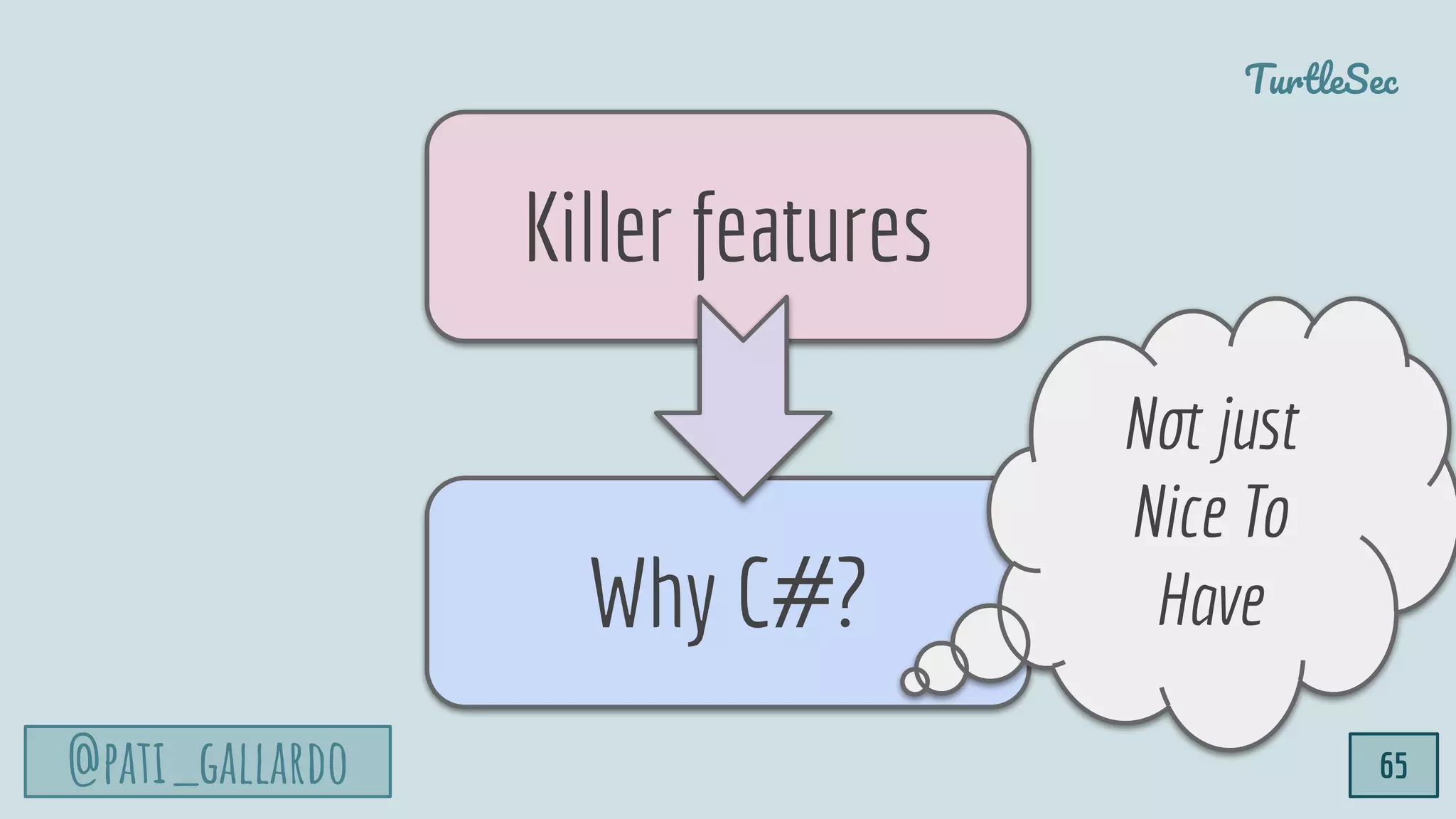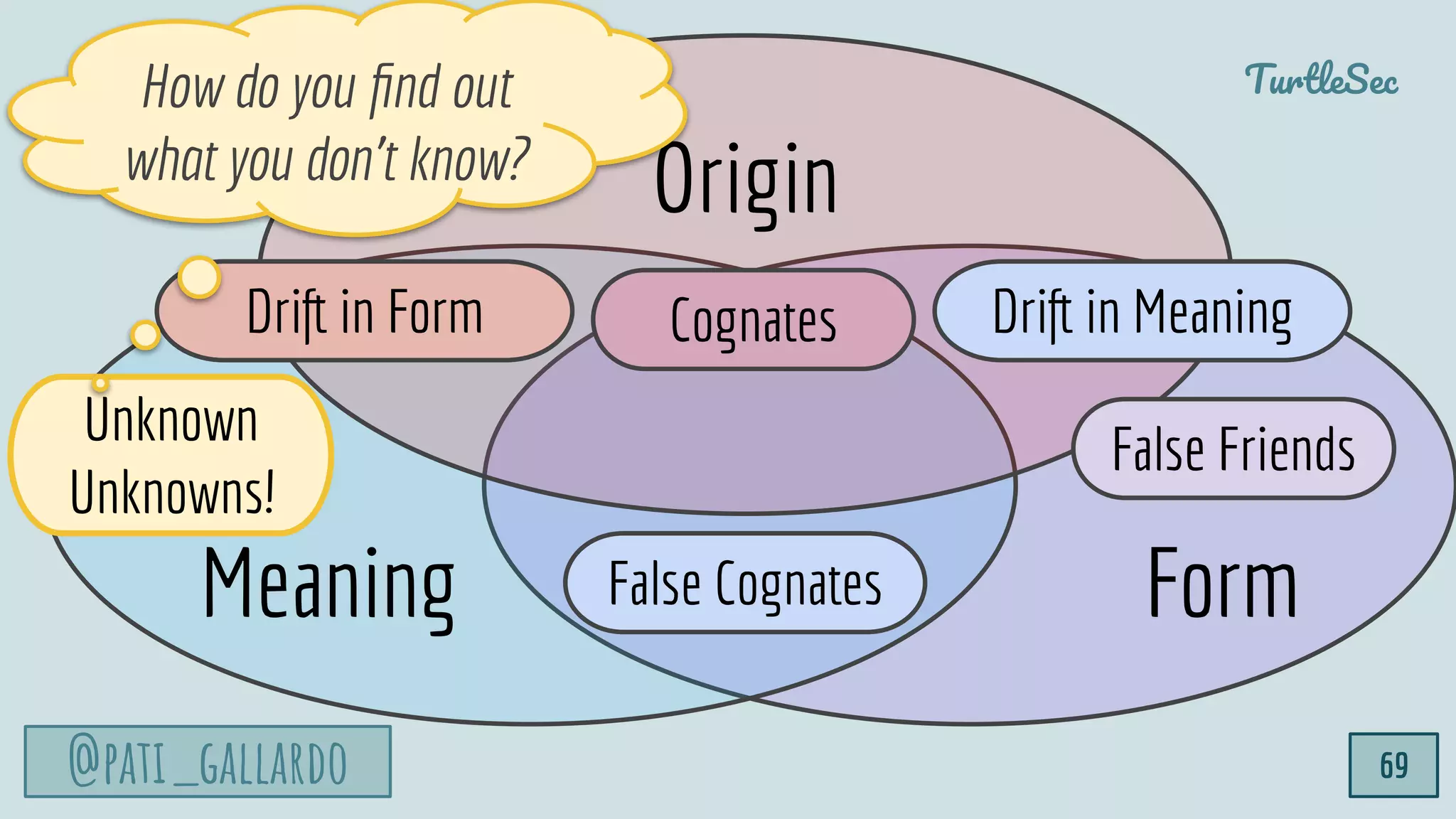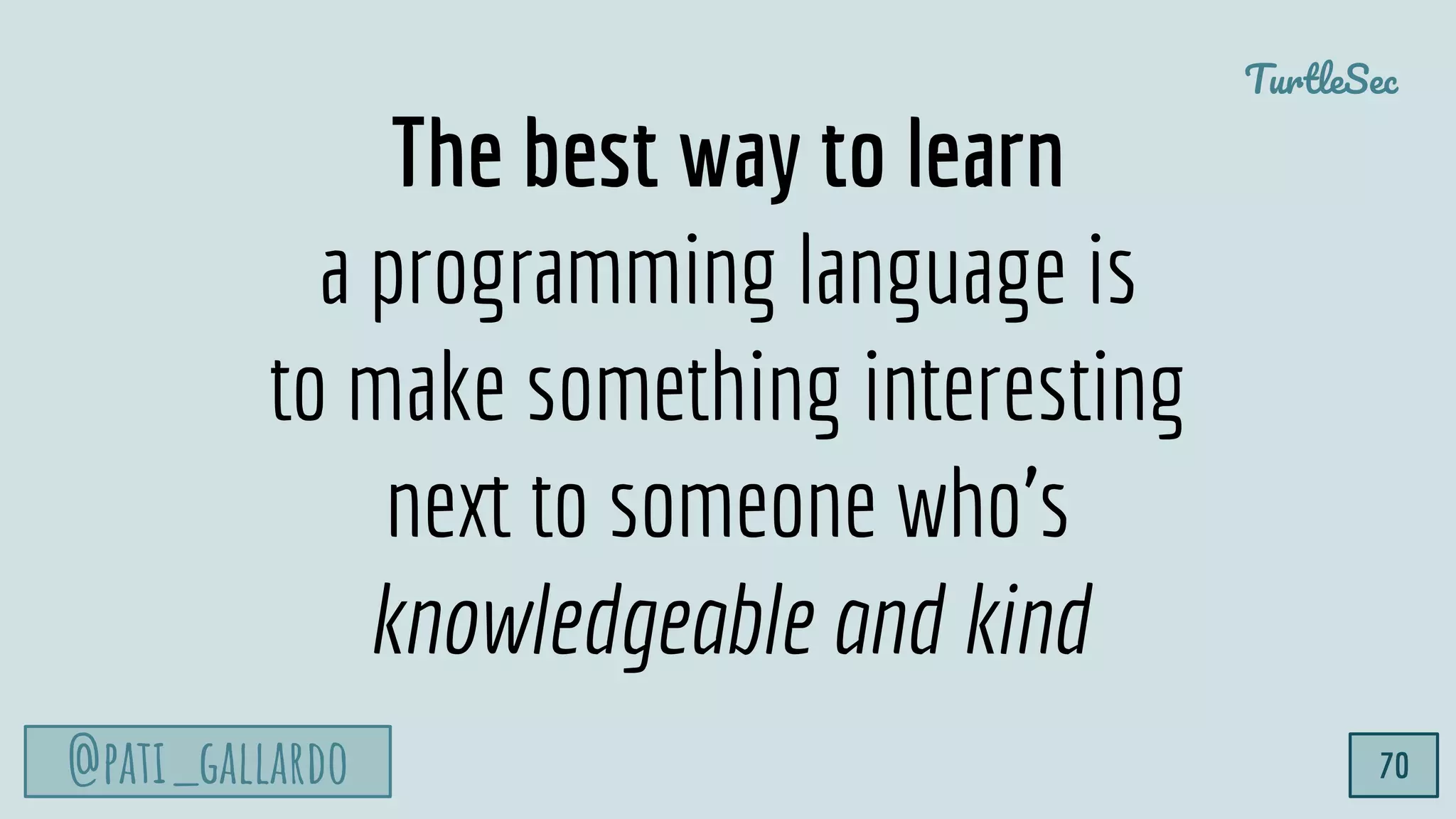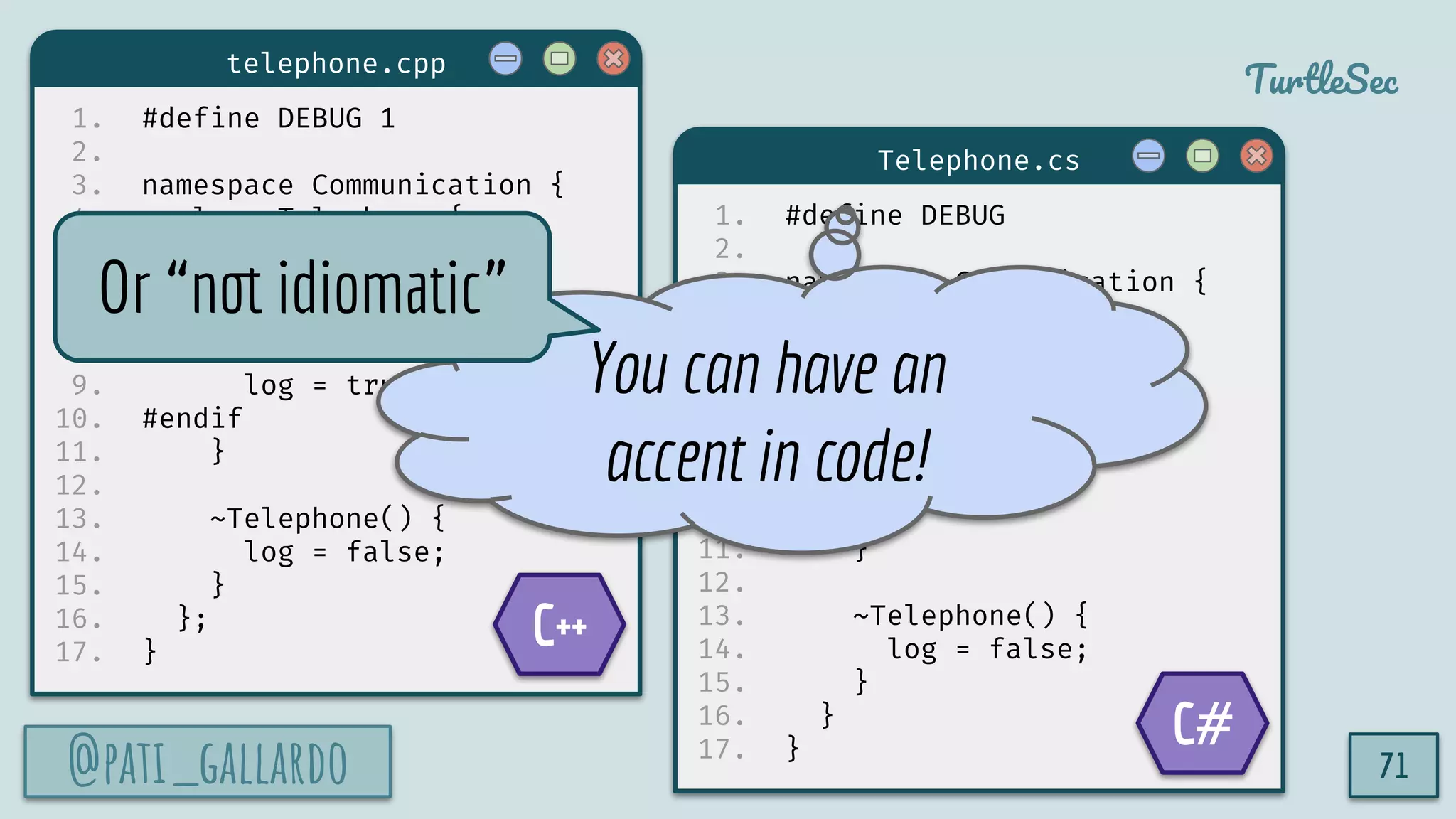The document discusses strategies for learning programming languages, particularly C#, emphasizing the importance of understanding basic syntax, identifying cognates and false cognates between languages, and recognizing the evolution of programming concepts. It provides examples of code snippets and highlights differences in terminology and functionality across languages like C++, Java, and Python. The content also reflects on teaching methods and encourages leveraging known terms to facilitate learning for students.

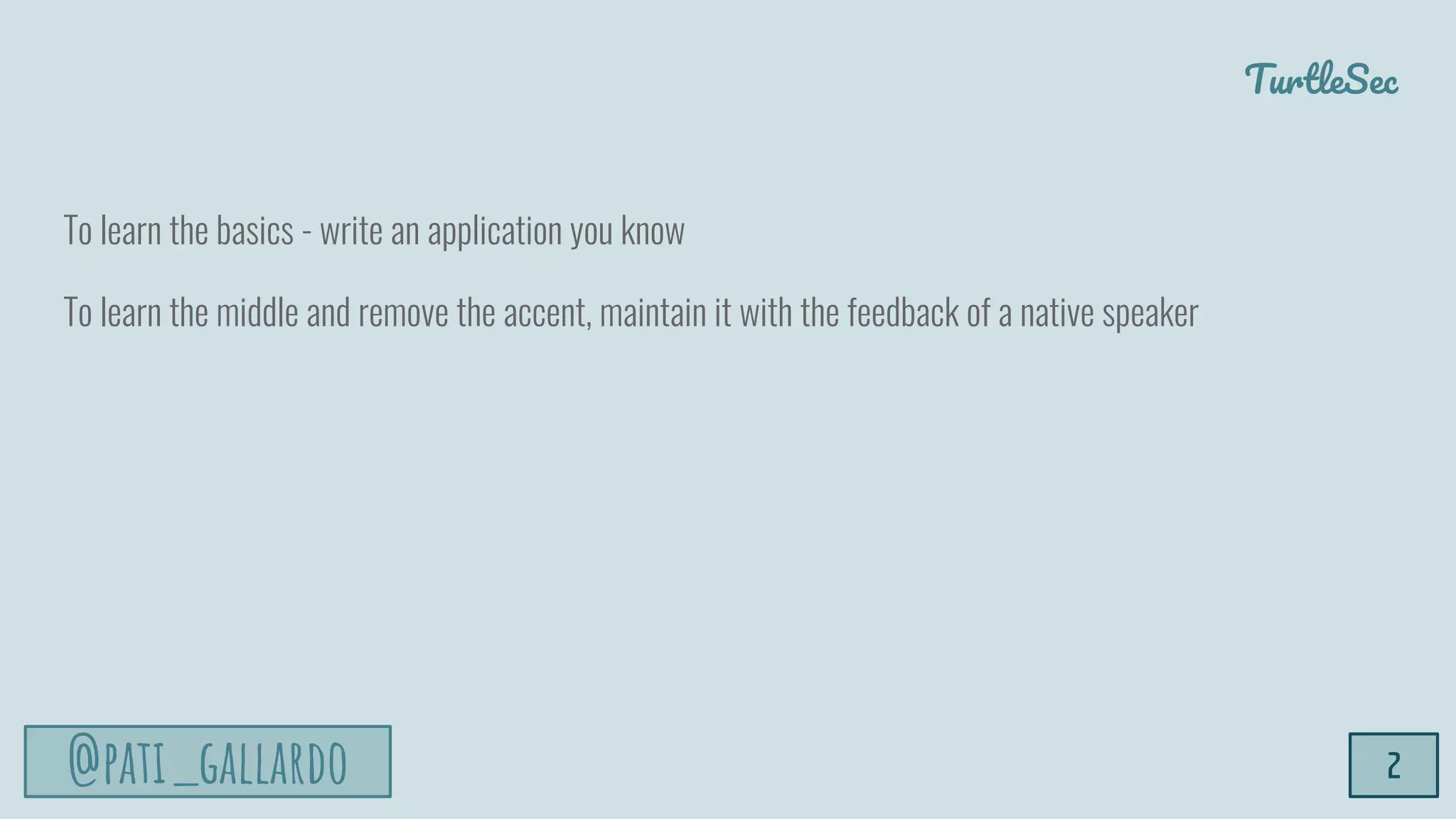
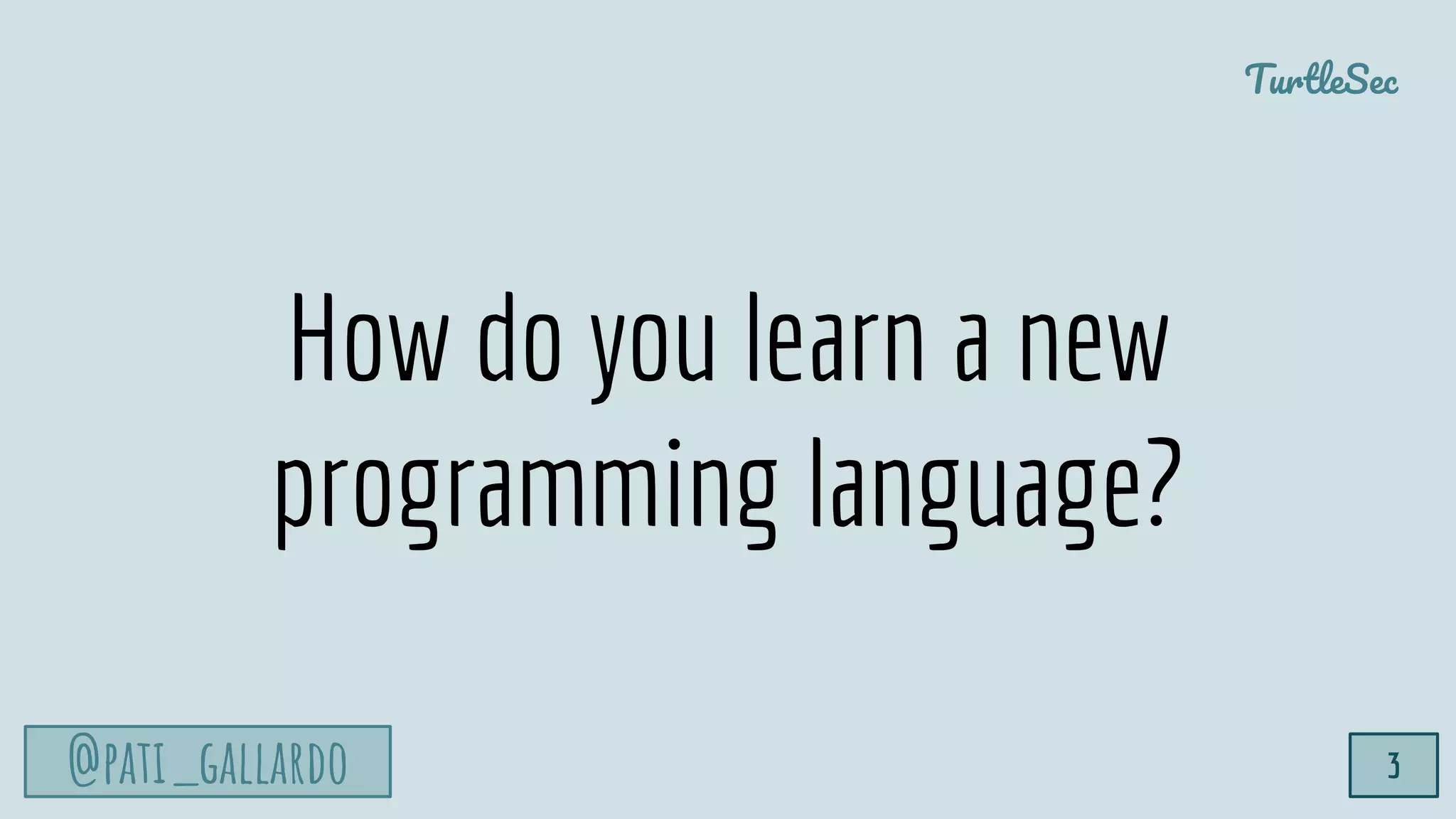

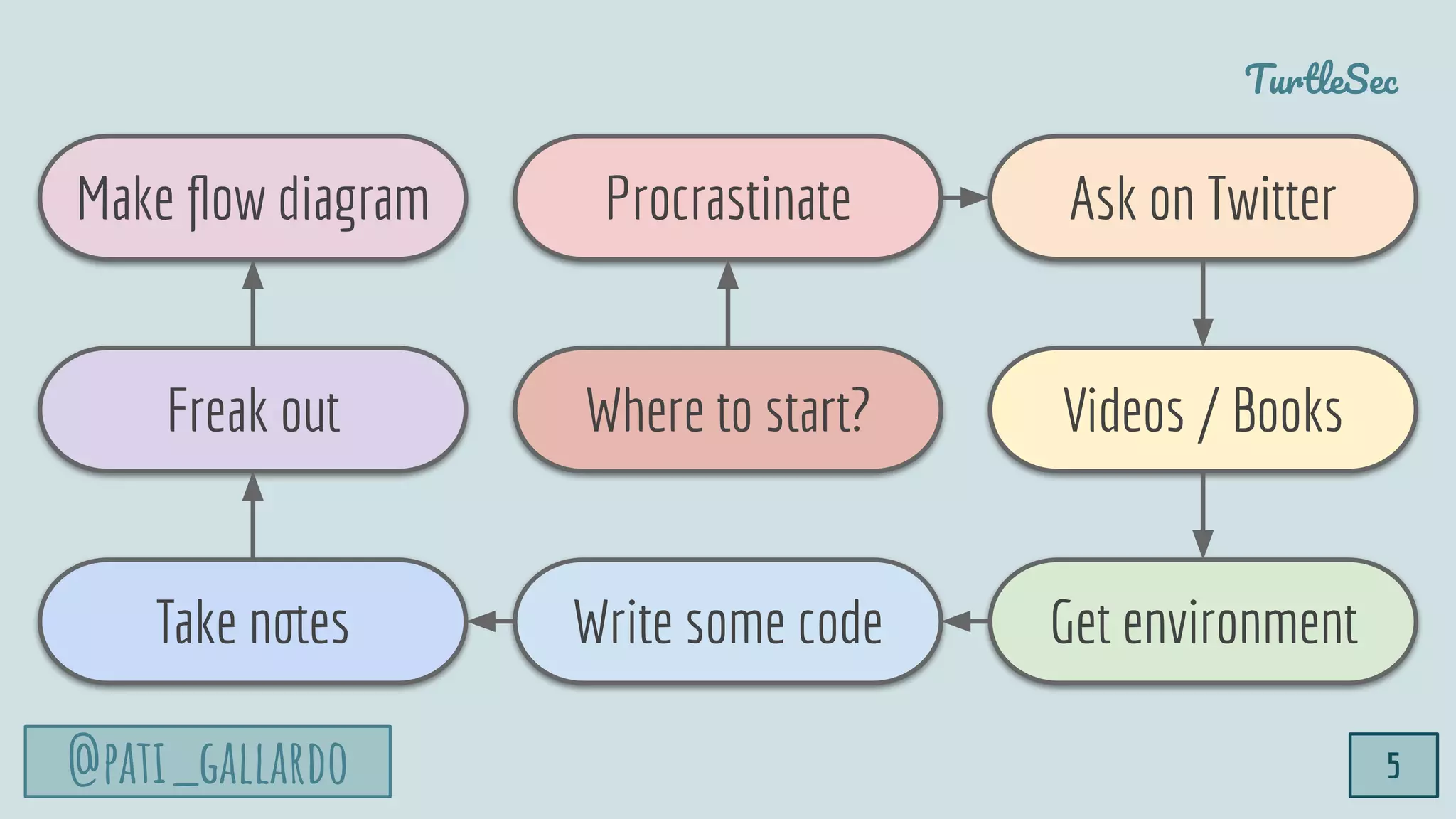
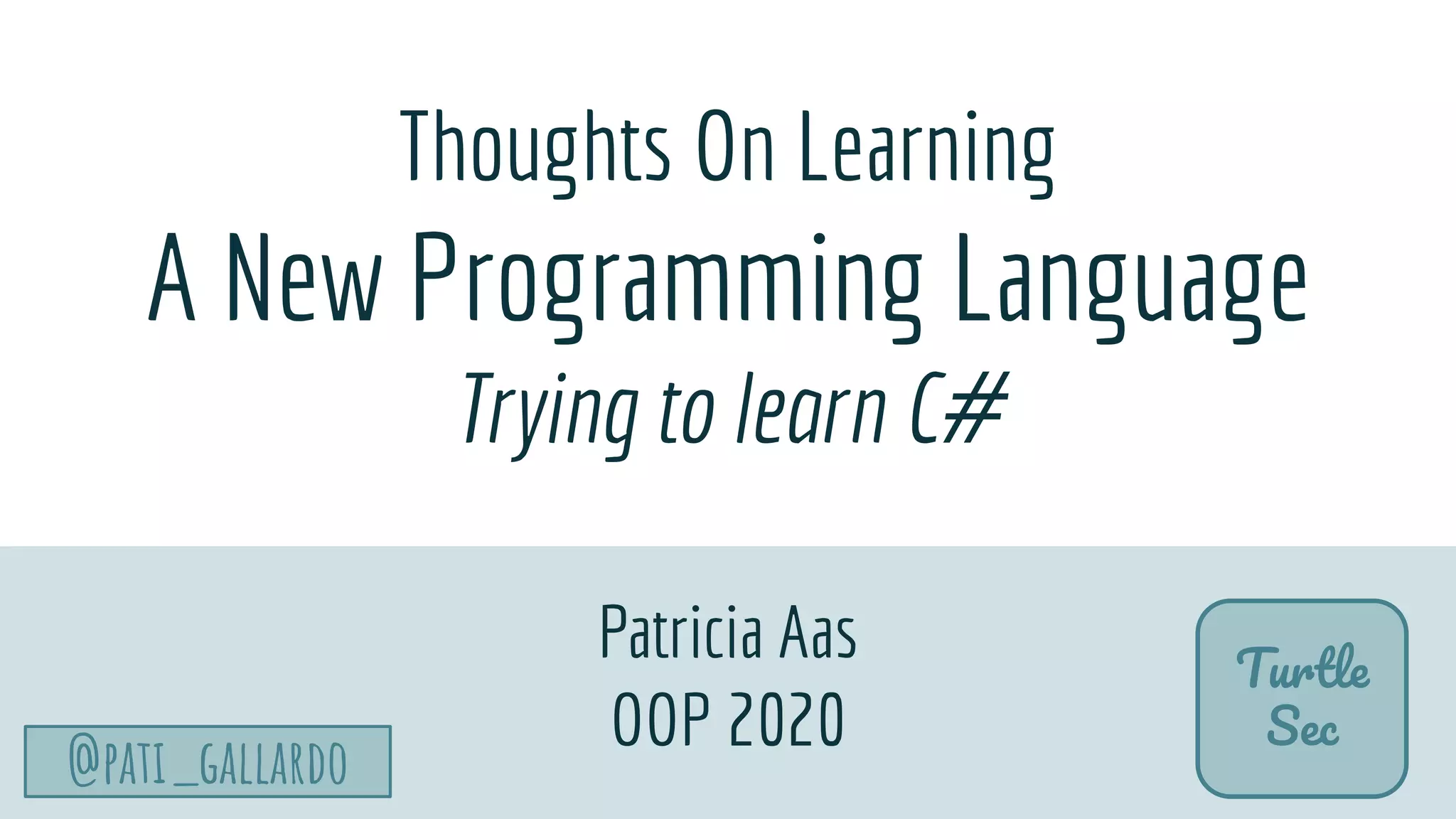
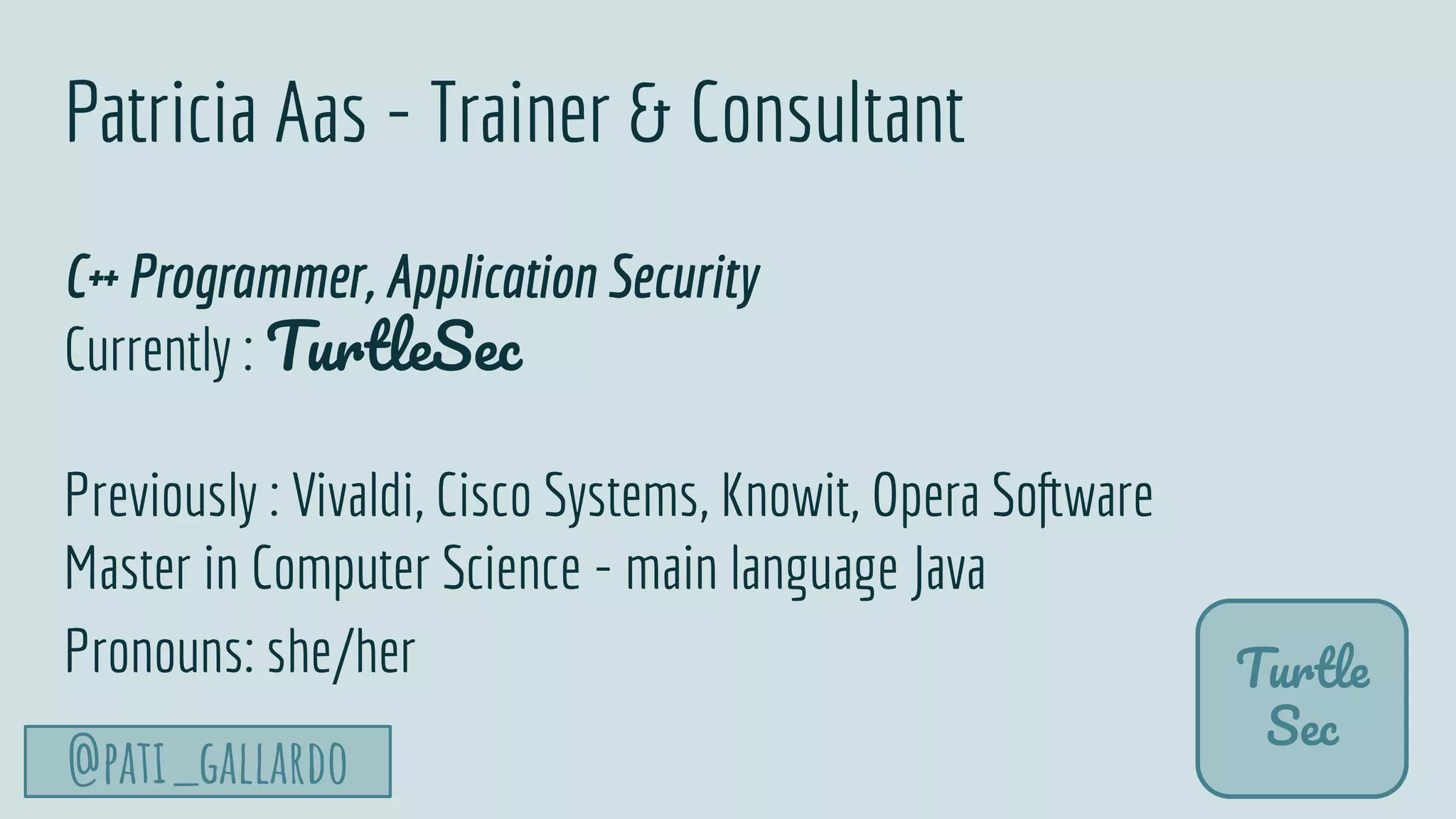

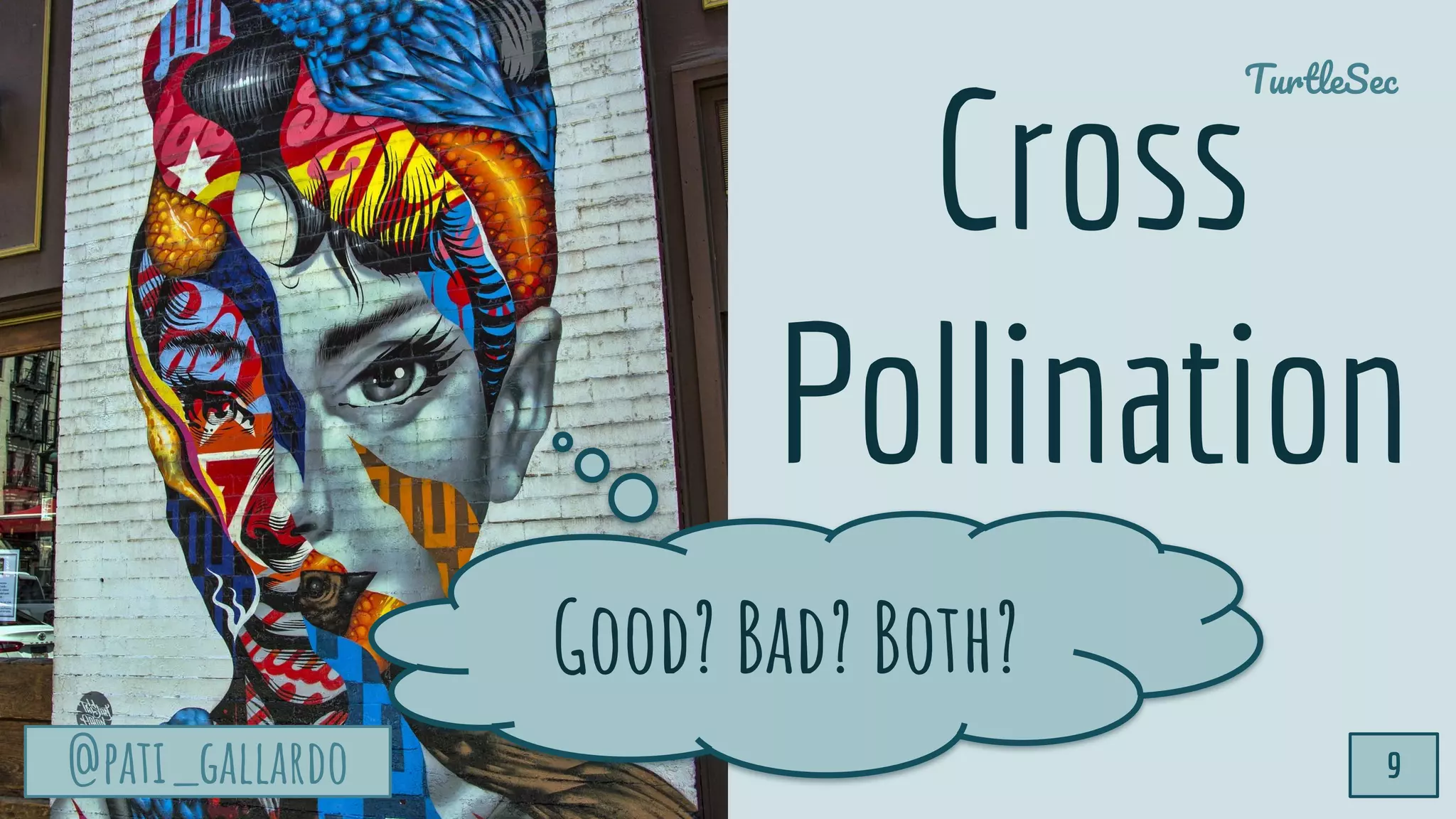
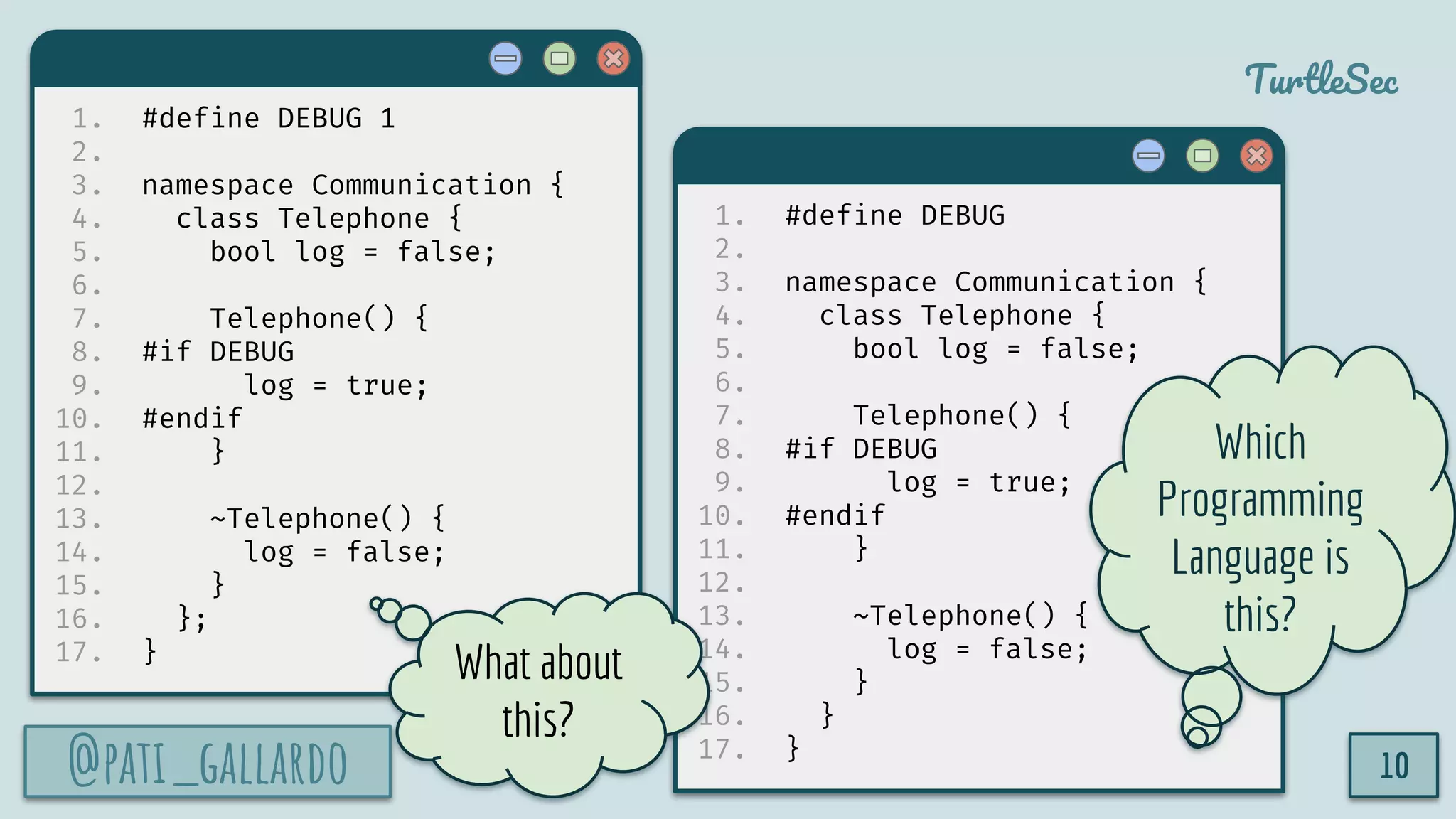
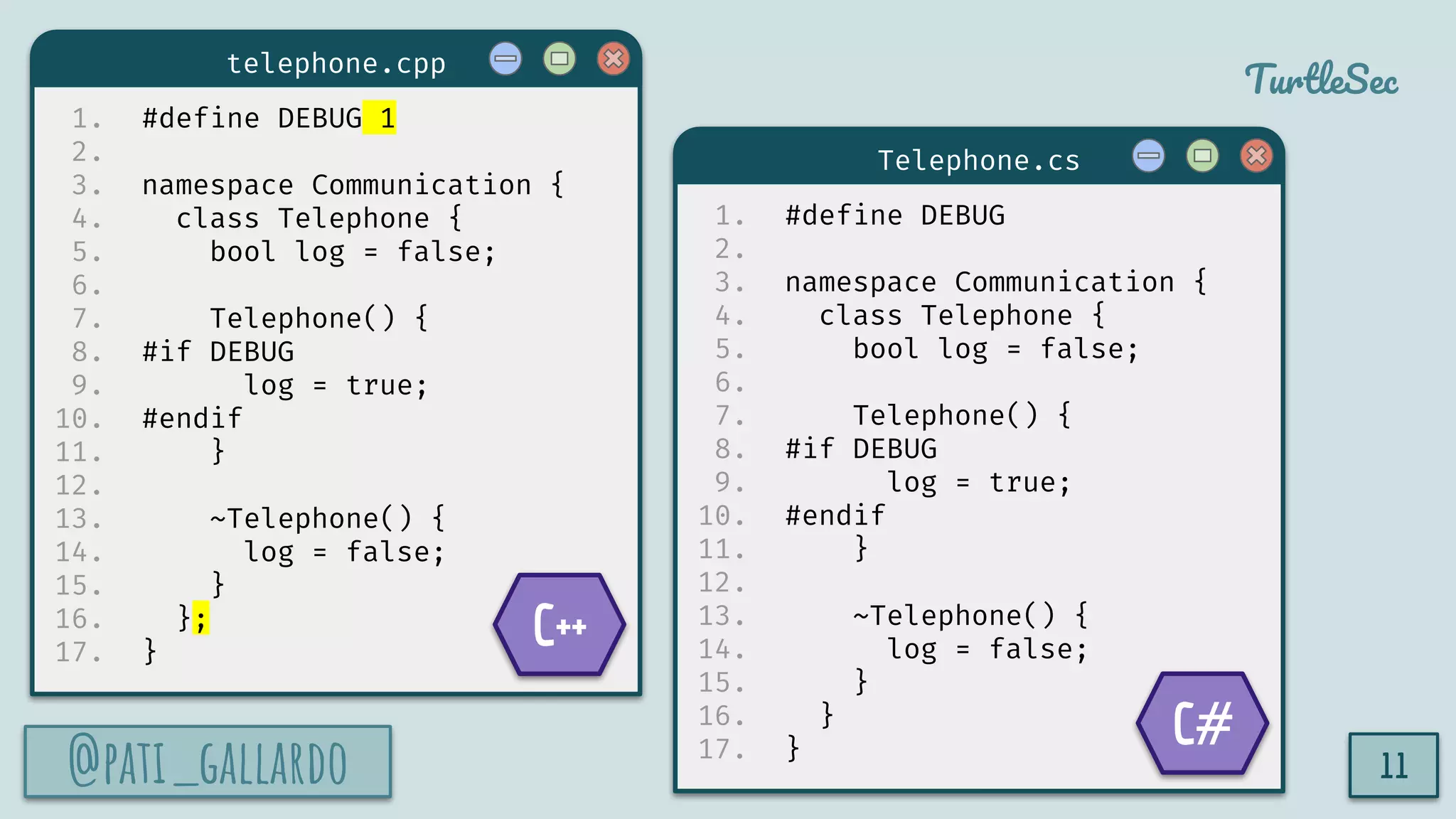


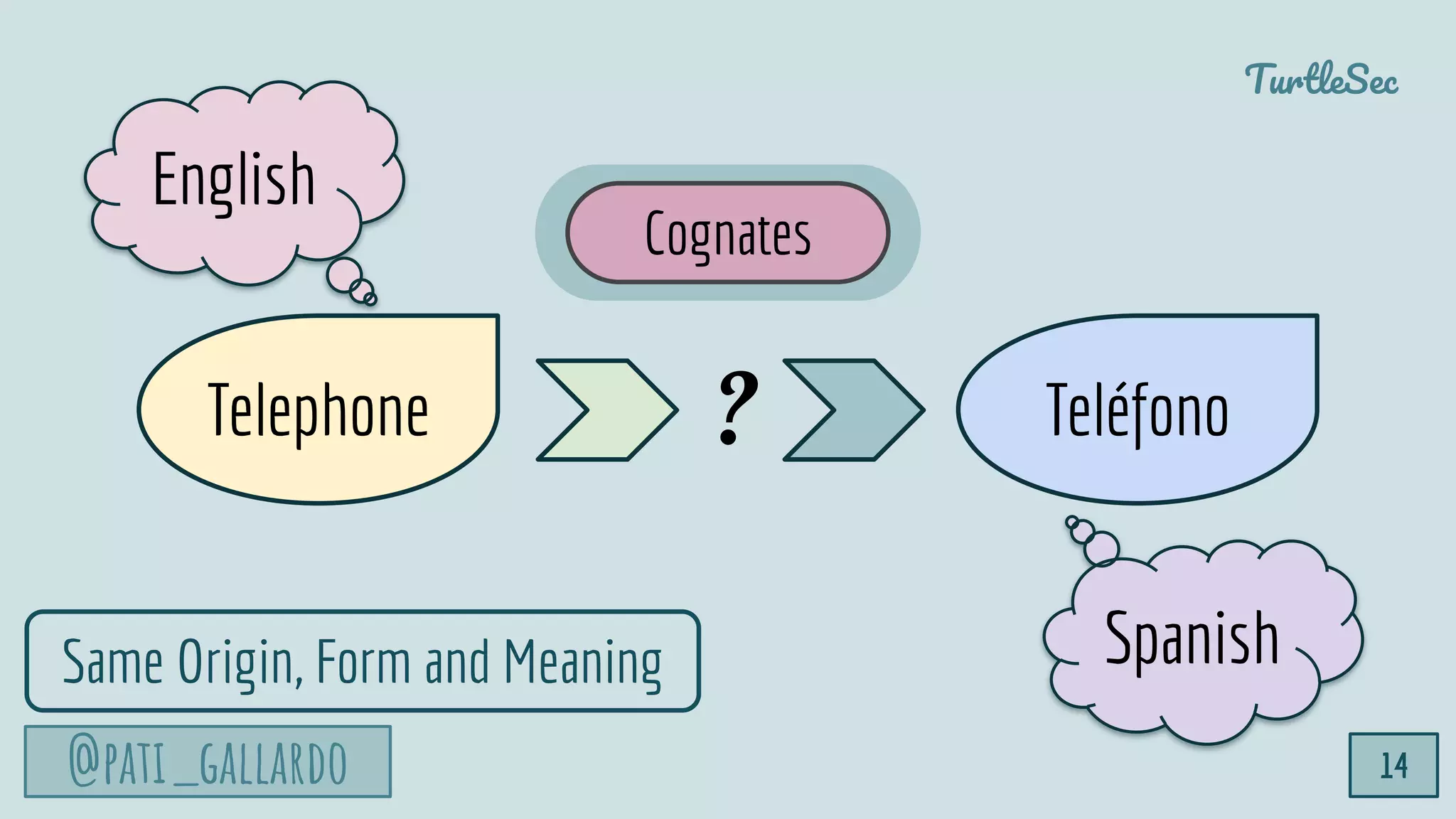
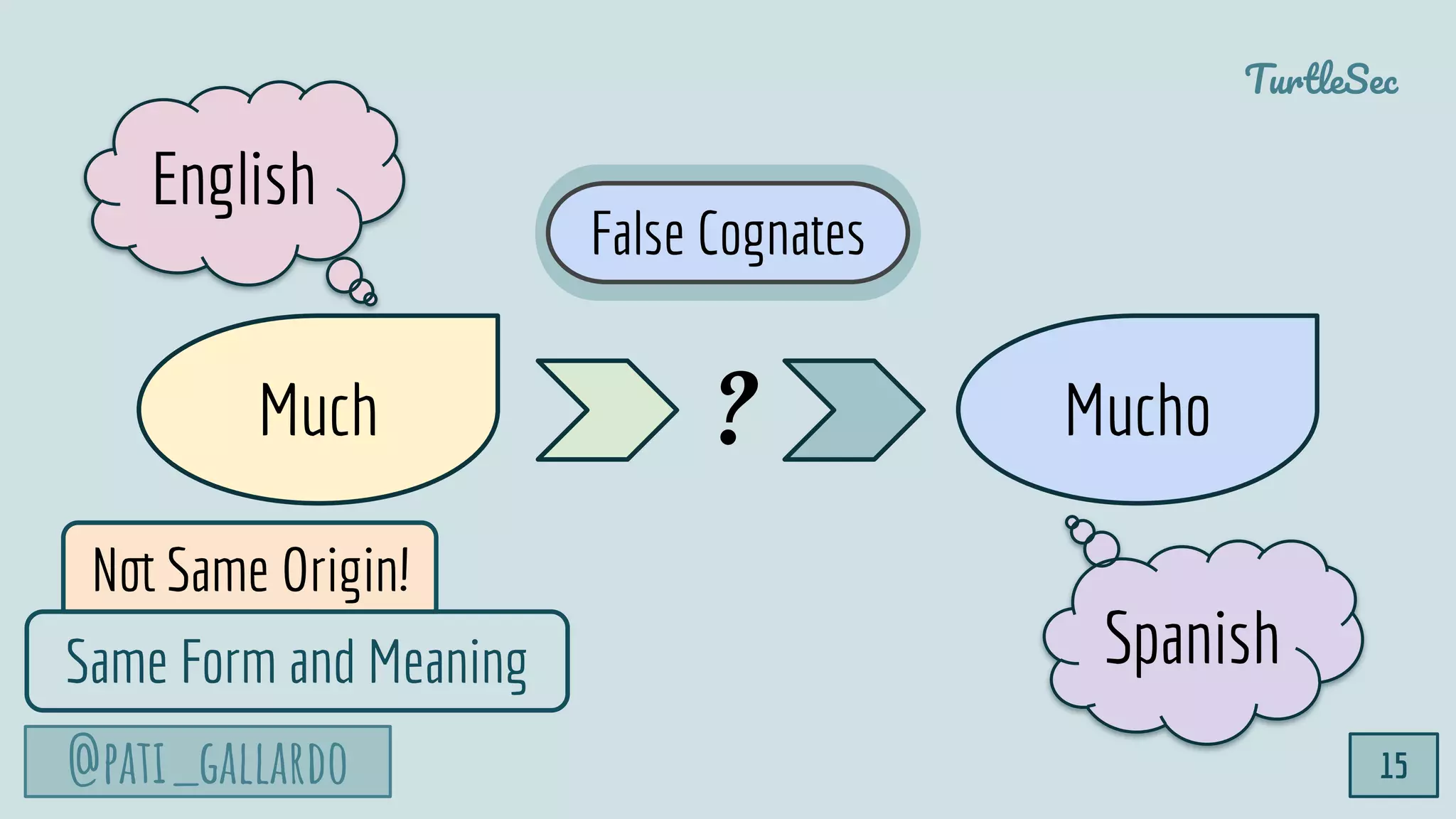

![@pati_gallardo
TurtleSec
C# : An Imperative C-like language?
1. var list = new List<int>(){ 40, 5, 9, 39, 19 };
2.
3. for (int i = 0; i < list.Count; i++) {
4. Console.WriteLine(list[i]);
5. }
6.
7. foreach (var item in list) {
8. Console.WriteLine(item);
9. }
@pati_gallardo 17
No Surprises](https://image.slidesharecdn.com/learninganewprogramminglanguage-201012175112/75/Thoughts-On-Learning-A-New-Programming-Language-17-2048.jpg)
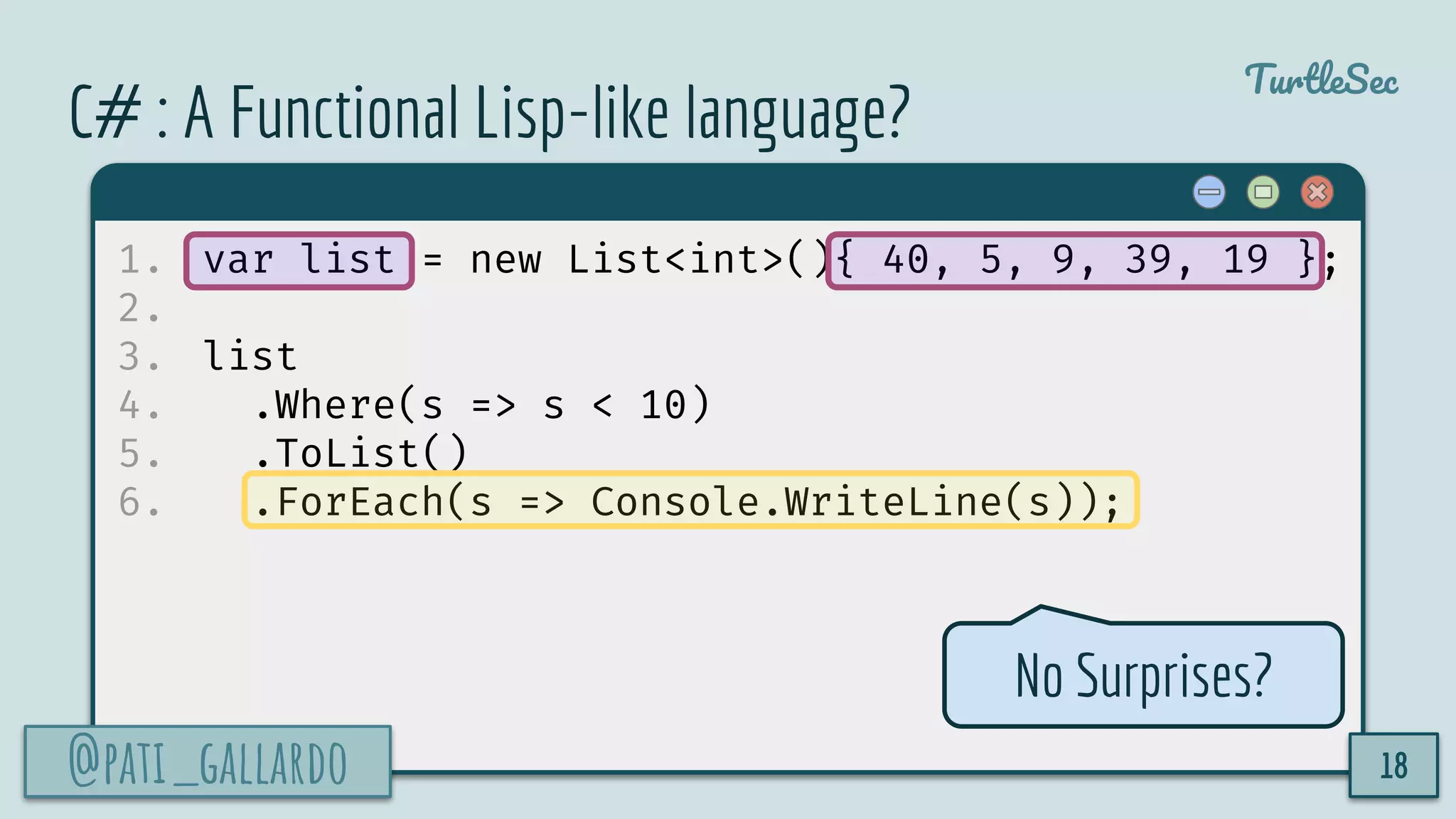
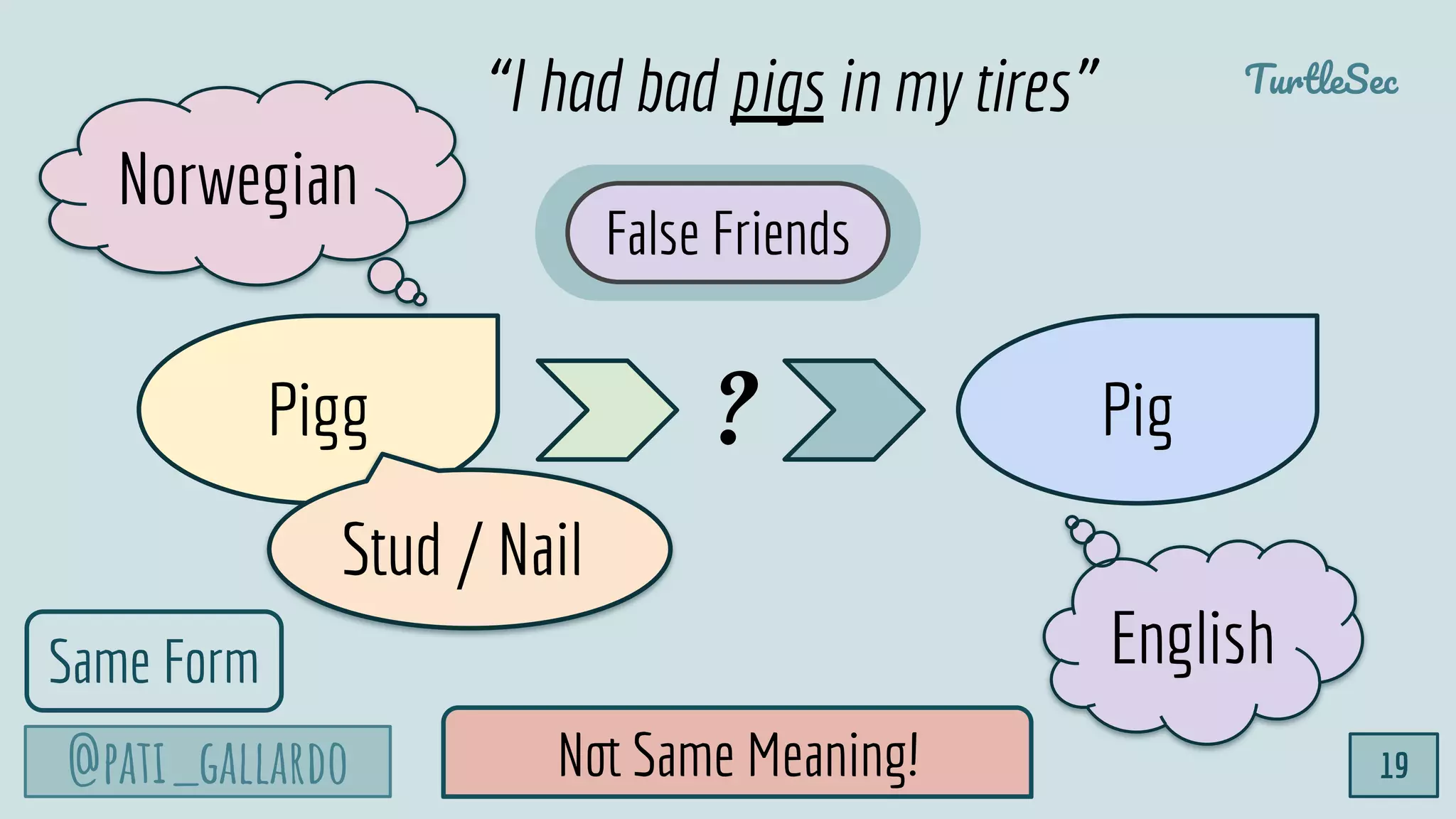

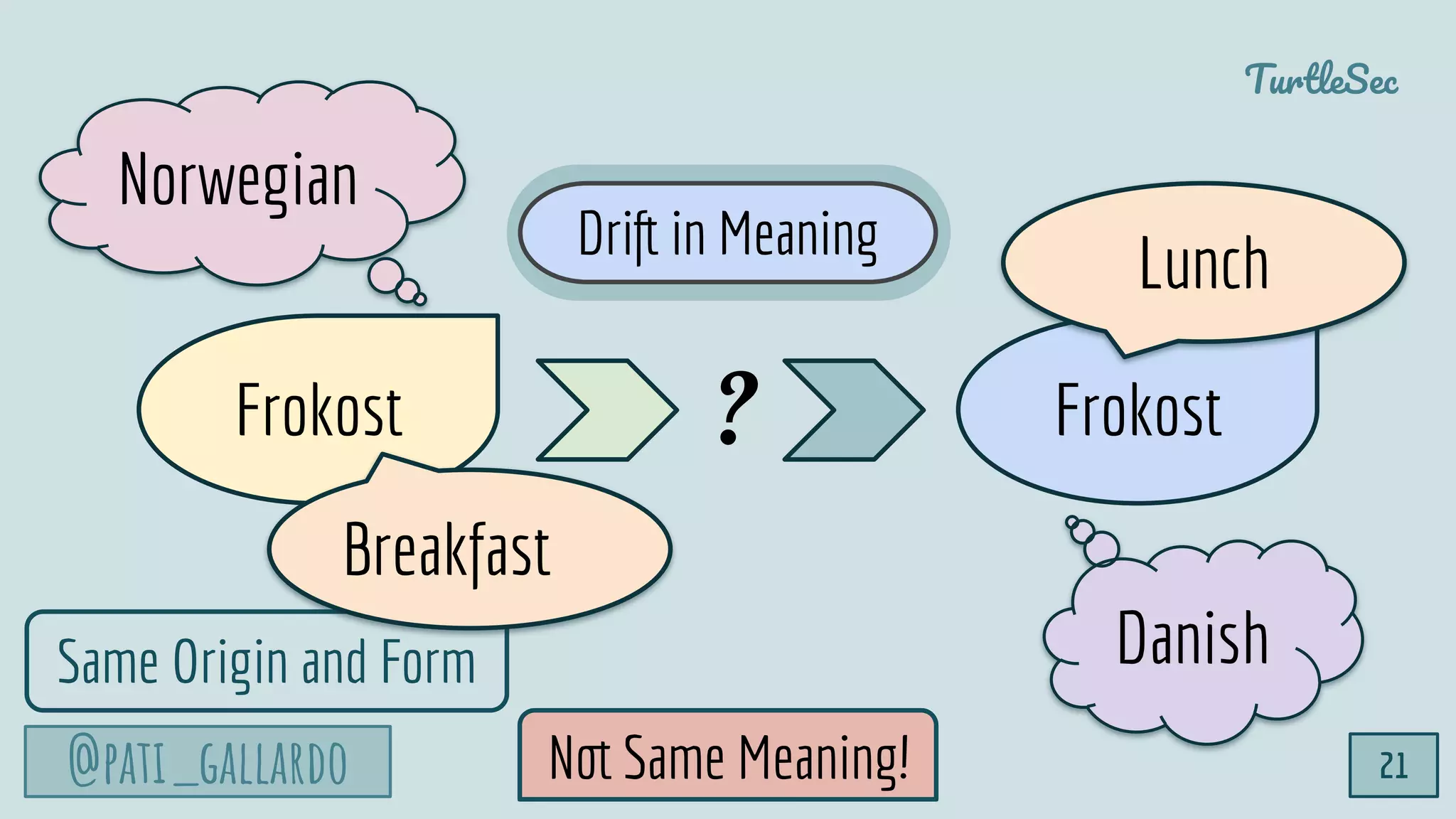
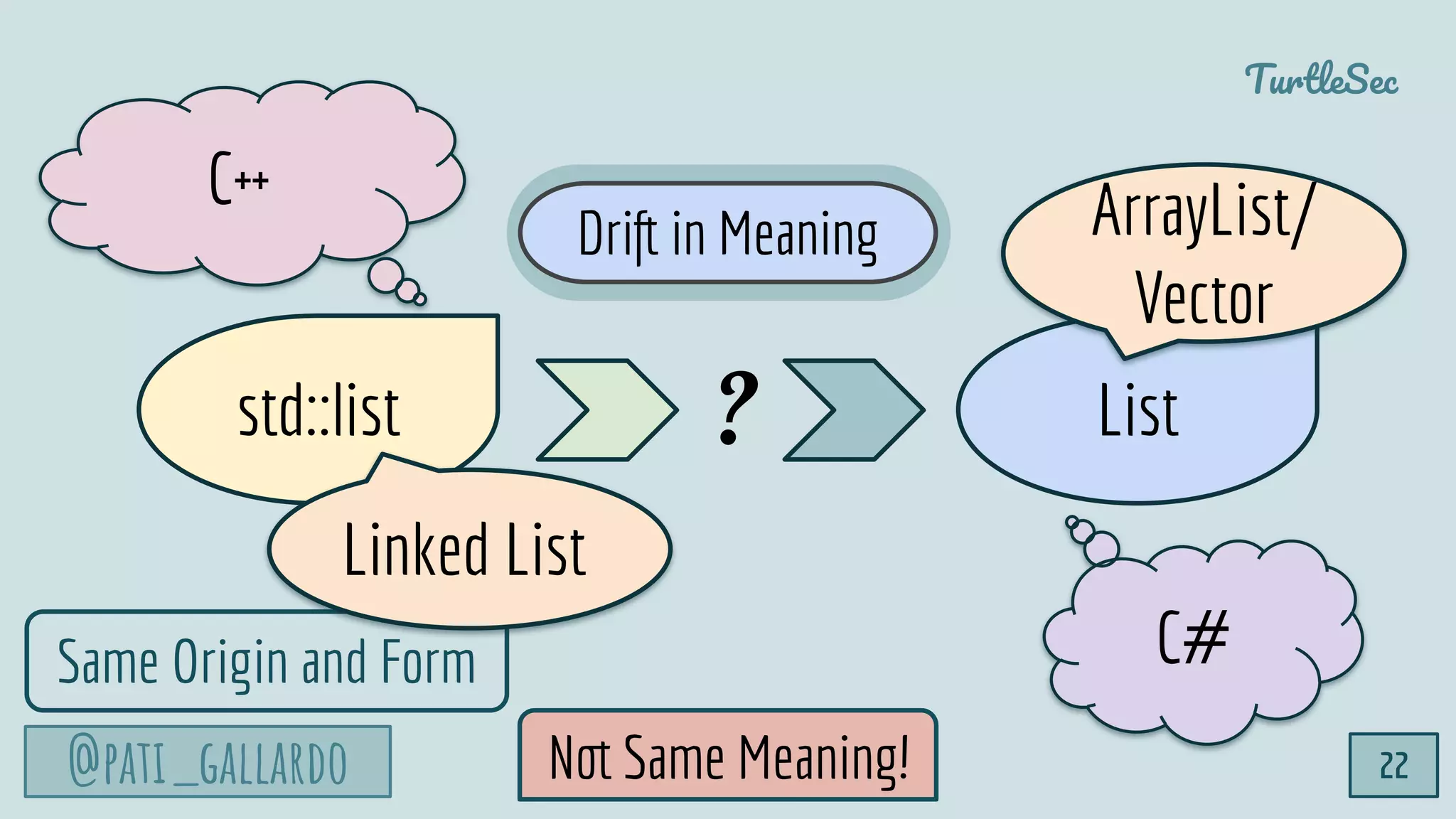
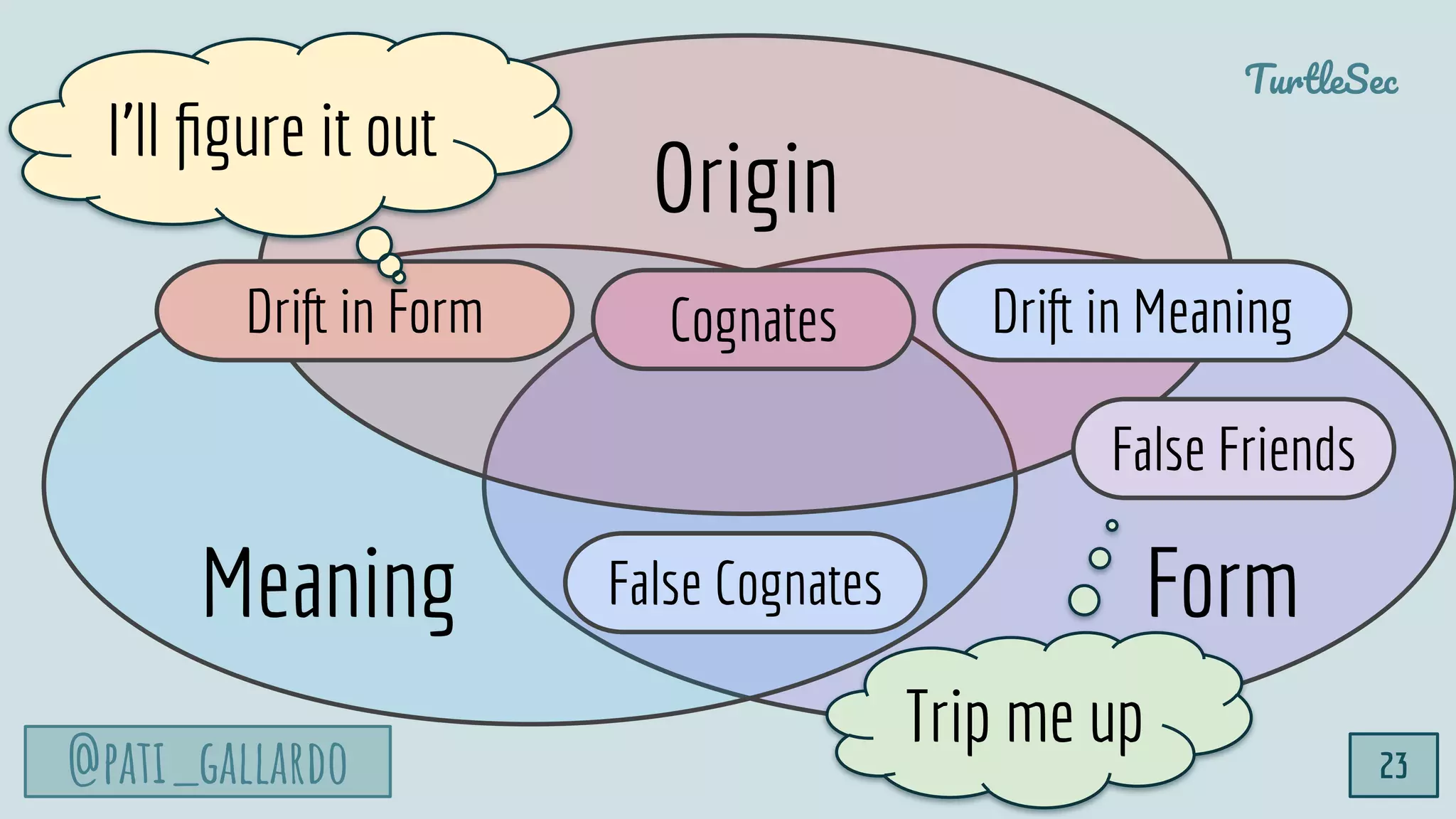

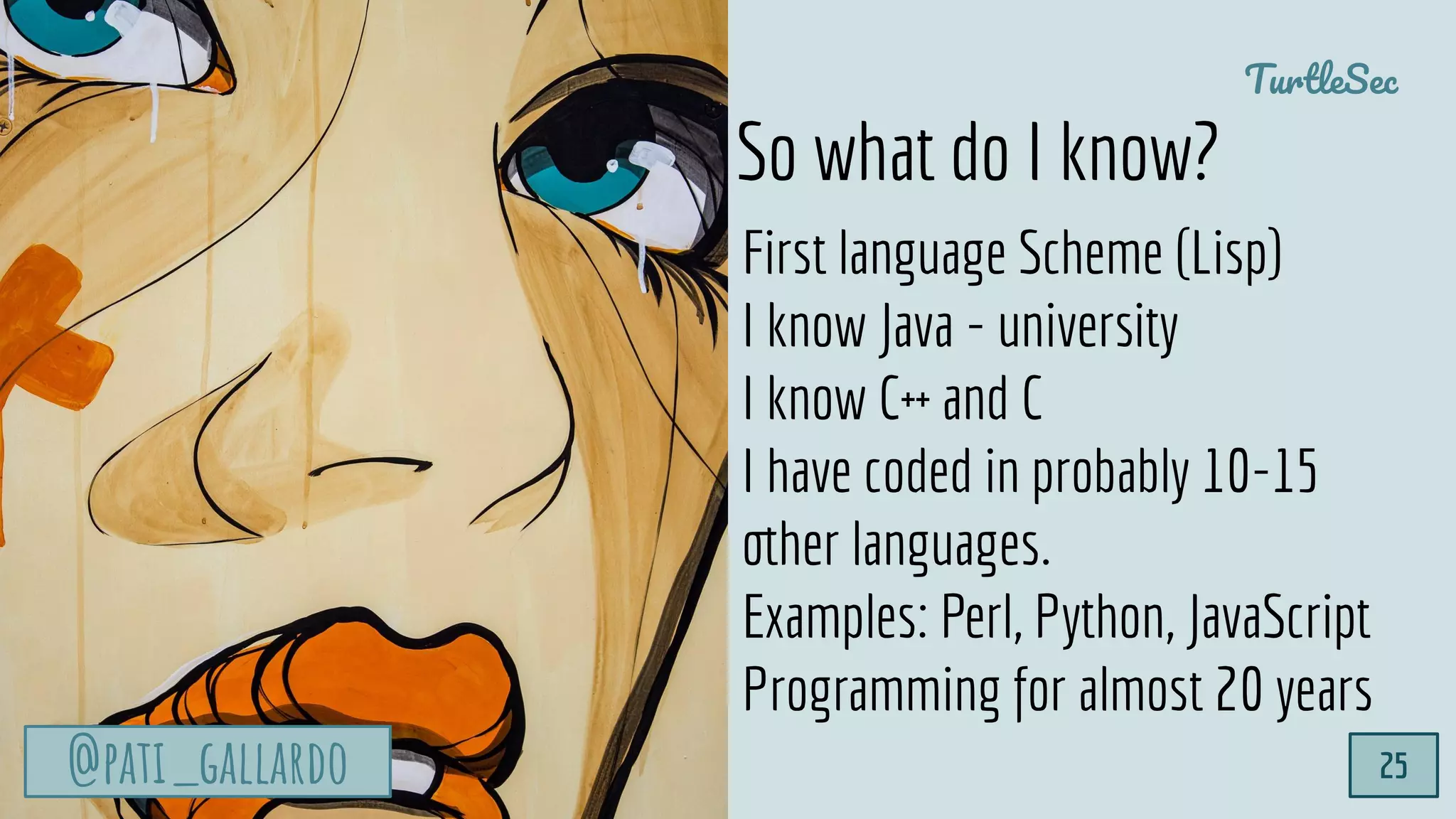

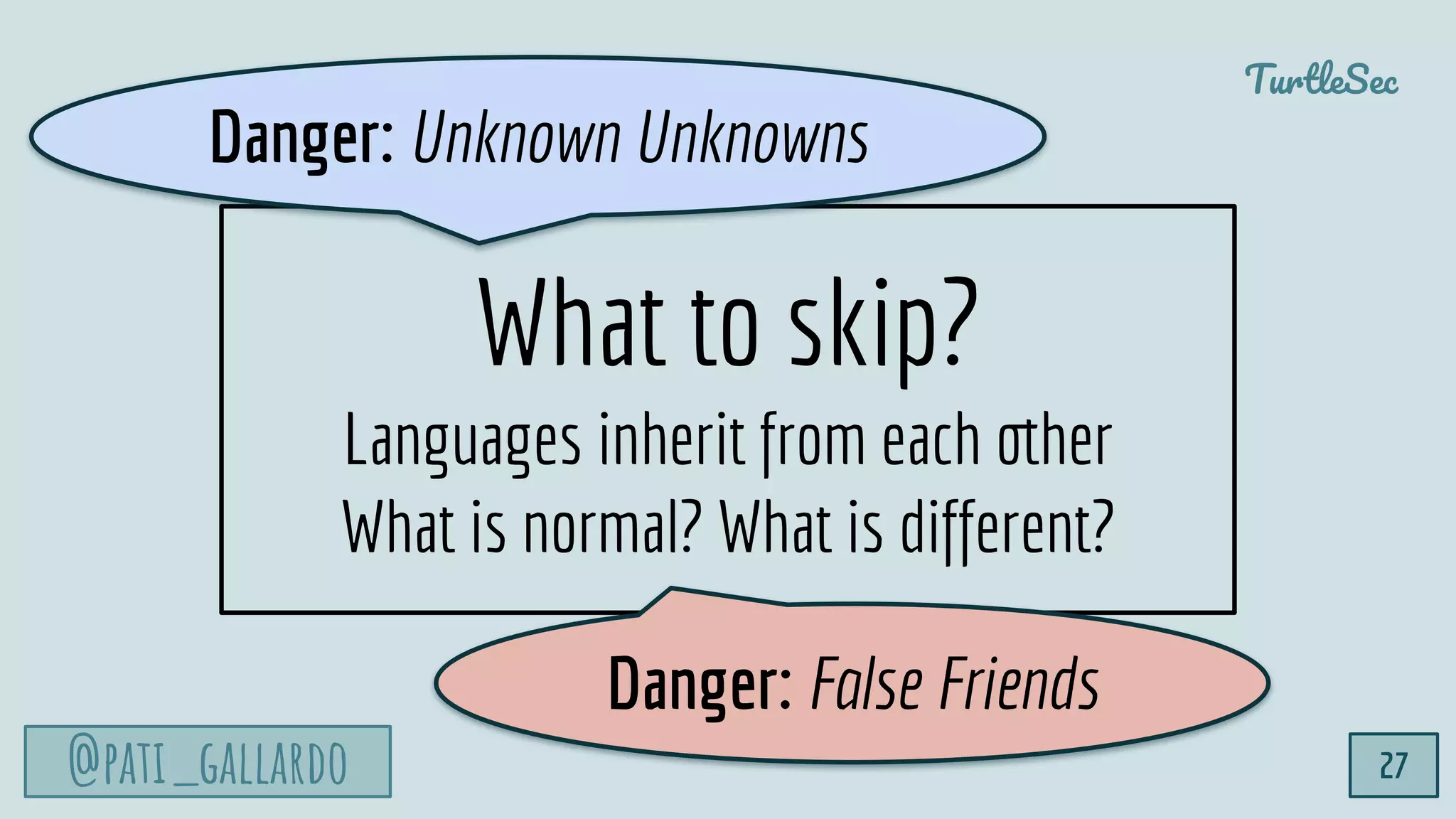


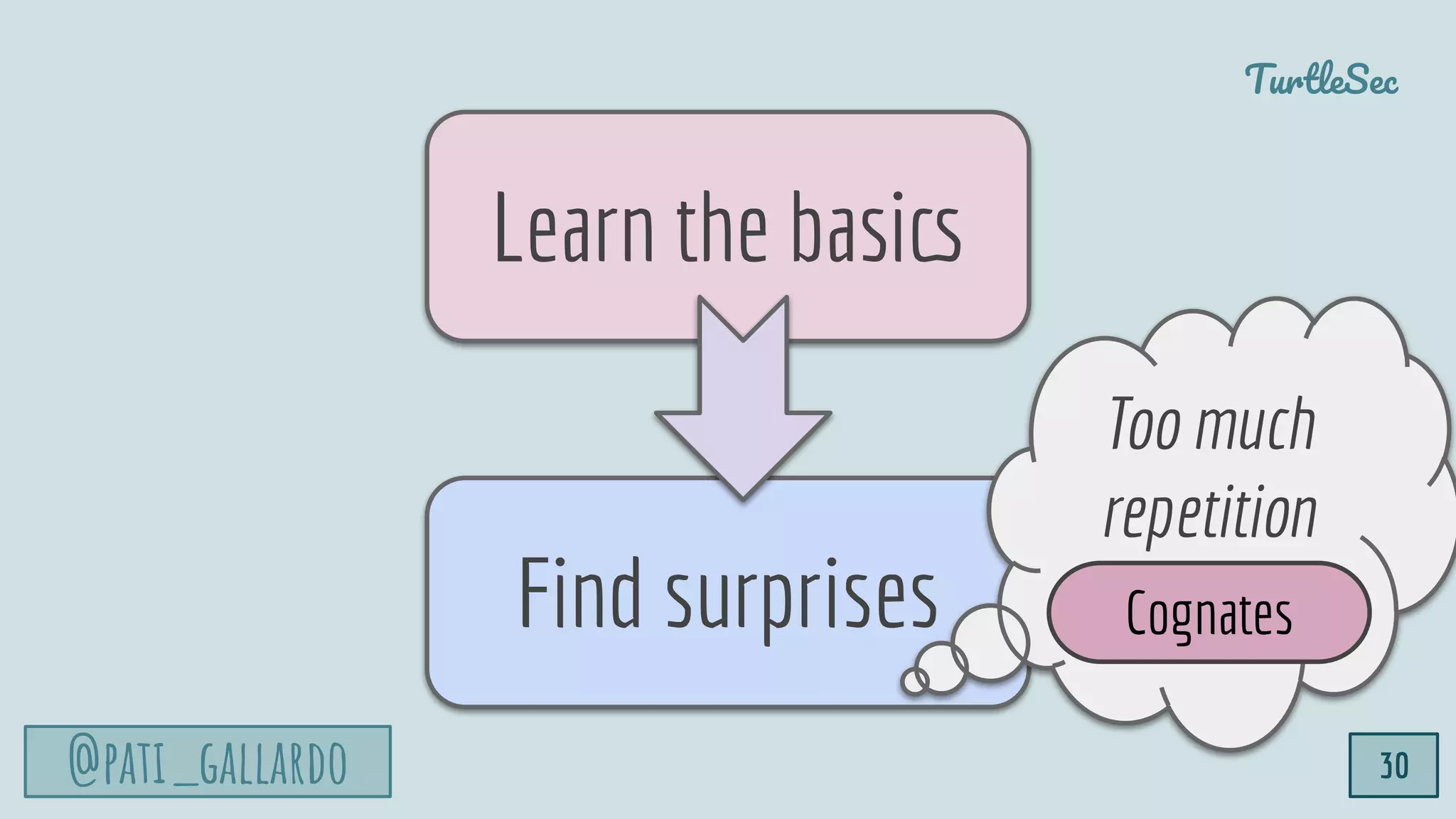
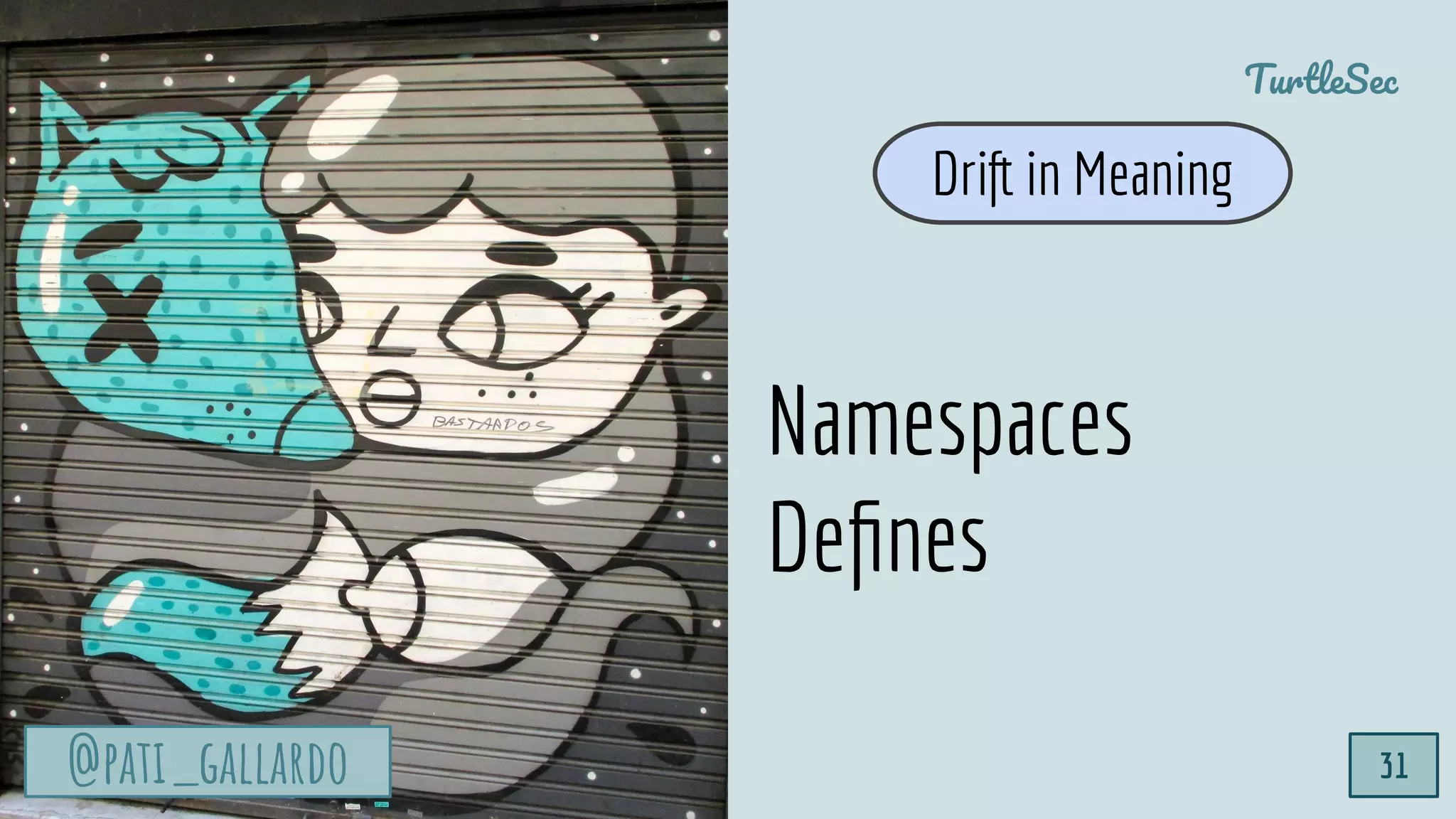
![@pati_gallardo
TurtleSec
32
1. namespace PackageName {
2. public class ClassName {
3. // Class definition
4. }
5. }
[C++] Namespaces
Recognition
Language
C#More like C++
modules really?
Drift in Meaning](https://image.slidesharecdn.com/learninganewprogramminglanguage-201012175112/75/Thoughts-On-Learning-A-New-Programming-Language-32-2048.jpg)
![@pati_gallardo
TurtleSec
[C & C++] C# has defines!
1. #define HERE_I_AM
2. using NUnit.Framework;
3.
4. public class Preprocessor {
5. [Test]
6. public void TestPreprocessor() {
7. #if HERE_I_AM
8. Assert.Pass();
9. #else
10. Assert.Fail();
11. #endif
12. }
13. }
@pati_gallardo 33
N really though.
No preprocessor
Drift in Meaning](https://image.slidesharecdn.com/learninganewprogramminglanguage-201012175112/75/Thoughts-On-Learning-A-New-Programming-Language-33-2048.jpg)
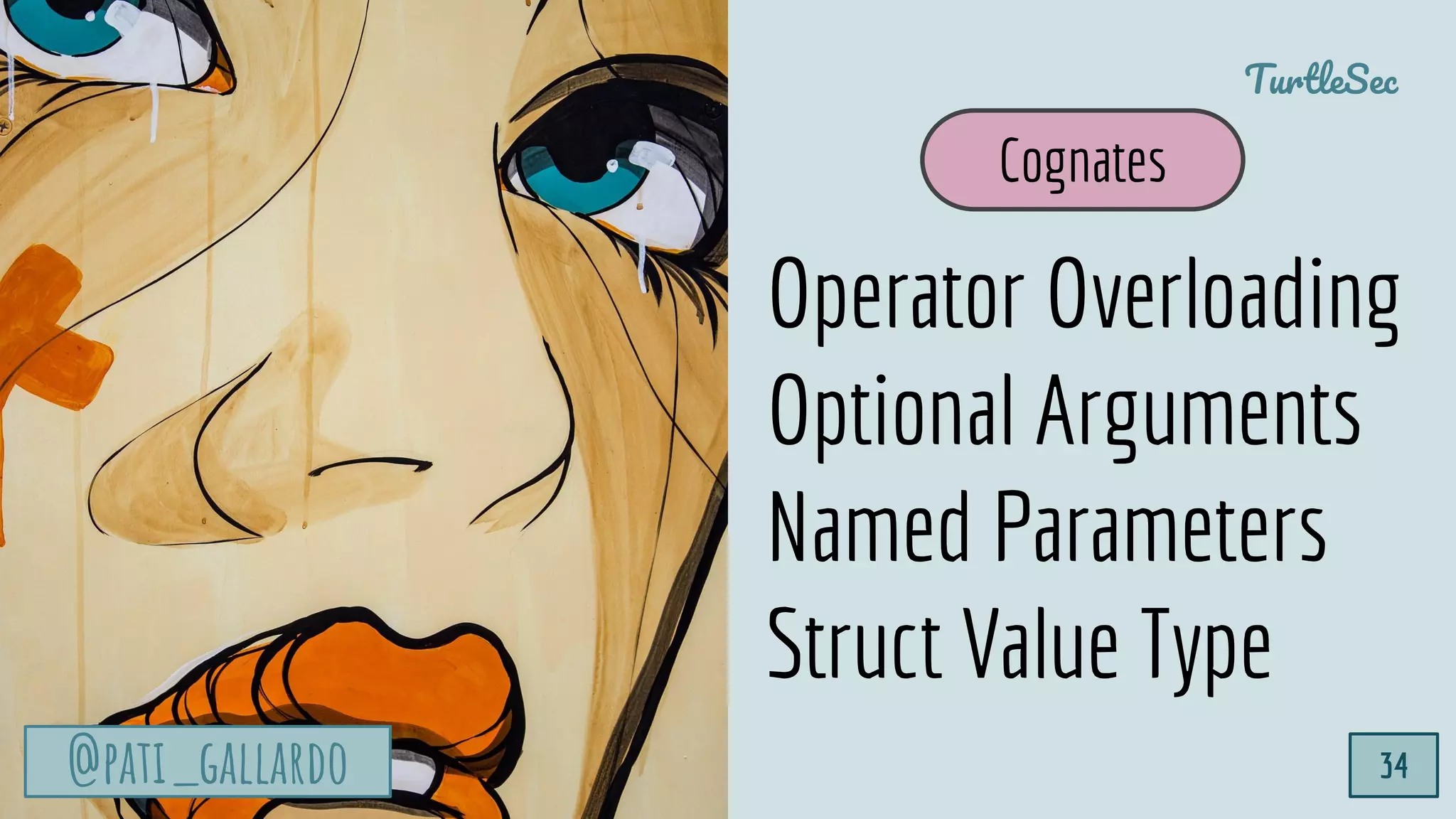
![@pati_gallardo
TurtleSec
[C++] Operator Overloading Use
1. Box first = new Box(new Point(1, 1), 3, 2);
2. Box second = new Box(new Point(3, 4), 3, 3);
3. Box boundingBox = first + second;
@pati_gallardo 35
Some constructs are quite elegant
with operator overloading](https://image.slidesharecdn.com/learninganewprogramminglanguage-201012175112/75/Thoughts-On-Learning-A-New-Programming-Language-35-2048.jpg)
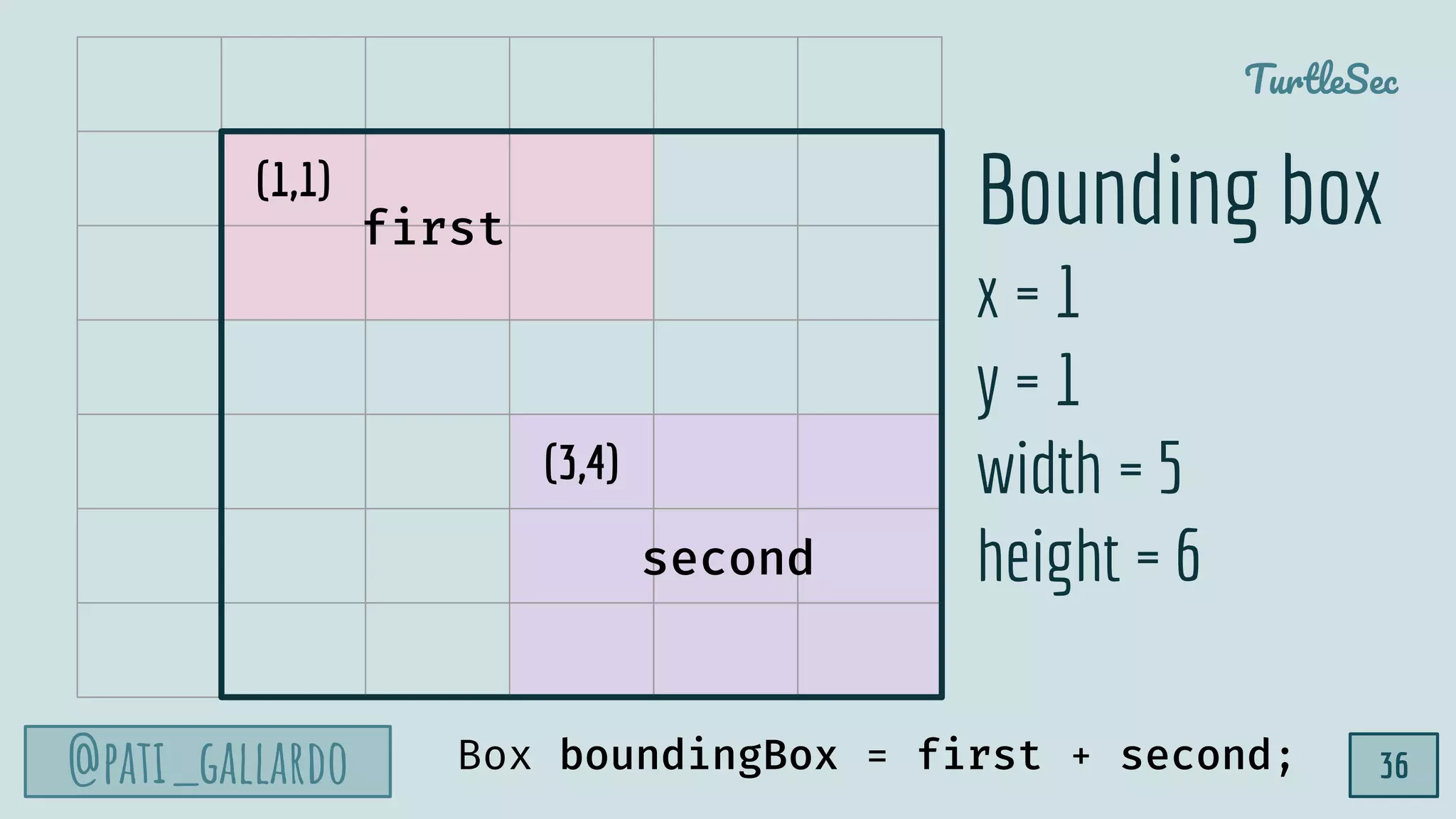
![@pati_gallardo
TurtleSec
[C++] Operator Overloading Definition
1. public static Box operator +(Box left, Box right) {
2. Point top =
3. new Point(Math.Min(left.top().x, right.top().x),
4. Math.Min(left.top().y, right.top().y));
5. Point bottom =
6. new Point(Math.Max(left.bottom().x, right.bottom().x),
7. Math.Max(left.bottom().y, right.bottom().y));
8. int width = bottom.x - top.x;
9. int height = bottom.y - top.y;
10. return new Box(top, width, height);
11. }
@pati_gallardo 37](https://image.slidesharecdn.com/learninganewprogramminglanguage-201012175112/75/Thoughts-On-Learning-A-New-Programming-Language-37-2048.jpg)
![@pati_gallardo
TurtleSec
[C++] Optional Arguments
1. public class OptionalArguments {
2. private static int increase(int x, int y = 2) {
3. return x + y;
4. }
5.
6. [Test]
7. public void TestOptionalArguments() {
8. Assert.AreEqual(5, increase(3));
9. }
10. }
@pati_gallardo 38](https://image.slidesharecdn.com/learninganewprogramminglanguage-201012175112/75/Thoughts-On-Learning-A-New-Programming-Language-38-2048.jpg)
![@pati_gallardo
TurtleSec
[Objective-C] Named Parameters
1. public class NamedParameters {
2. private static int named(int x, int y) {
3. return x + y;
4. }
5.
6. [Test]
7. public void TestNamedParameters() {
8. Assert.AreEqual(5, named(y: 3, x: 2));
9. }
10. }
@pati_gallardo 39](https://image.slidesharecdn.com/learninganewprogramminglanguage-201012175112/75/Thoughts-On-Learning-A-New-Programming-Language-39-2048.jpg)
![@pati_gallardo
TurtleSec
[C++] Struct - value type
1. struct Point {
2. public int x;
3. public int y;
4. }
@pati_gallardo 40
Similar in meaning to C++Drift in Form
In C++ structs are classes with default
public access - in C# structs are
classes that don’t allow inheritance
In C++ all types
are value types
Cognates](https://image.slidesharecdn.com/learninganewprogramminglanguage-201012175112/75/Thoughts-On-Learning-A-New-Programming-Language-40-2048.jpg)

![@pati_gallardo
TurtleSec
[Qt?] Properties
1. public class Properties {
2. public string ReadWriteProperty { get; set; } = "Hello";
3. public string ReadOnlyProperty { get; }
4. // Auto-implemented properties must have get accessors.
5. // public string WriteOnlyProperty { set; }
6. public string PrivateReadWriteProperty { private get; set; }
7. public string ReadPrivateWriteProperty { get; private set; }
8.
9. private string PrivateReadWriteField;
10. public string WrapField {
11. set => PrivateReadWriteField = value;
12. get => PrivateReadWriteField;
13. }
14. }
@pati_gallardo 42
Magic “value”](https://image.slidesharecdn.com/learninganewprogramminglanguage-201012175112/75/Thoughts-On-Learning-A-New-Programming-Language-42-2048.jpg)
![@pati_gallardo
TurtleSec
[C & C++] (Inline) Out Parameters
1. private static int outParam(int x, int y, out int mod) {
2. mod = x % y;
3. return x / y;
4. }
5.
6. [Test]
7. public void TestOutParameters() {
8. int quotient = outParam(25, 5, out var remainder);
9. Assert.AreEqual(0, remainder);
10. Assert.AreEqual(5, quotient);
11. }
@pati_gallardo 43
Passing int
by ref](https://image.slidesharecdn.com/learninganewprogramminglanguage-201012175112/75/Thoughts-On-Learning-A-New-Programming-Language-43-2048.jpg)
![@pati_gallardo
TurtleSec
[] Null-conditional operators ?. and ?[]
1. int GetCoffee(List<Shop> coffeeShops, int index) {
2. // If there are any coffeeShops and
3. // if there is a shop at that index,
4. // please get me that coffee,
5. // if not, just get me 0
6. return coffeeShops?[index]?.Coffee ?? 0;
7. }
@pati_gallardo 44](https://image.slidesharecdn.com/learninganewprogramminglanguage-201012175112/75/Thoughts-On-Learning-A-New-Programming-Language-44-2048.jpg)
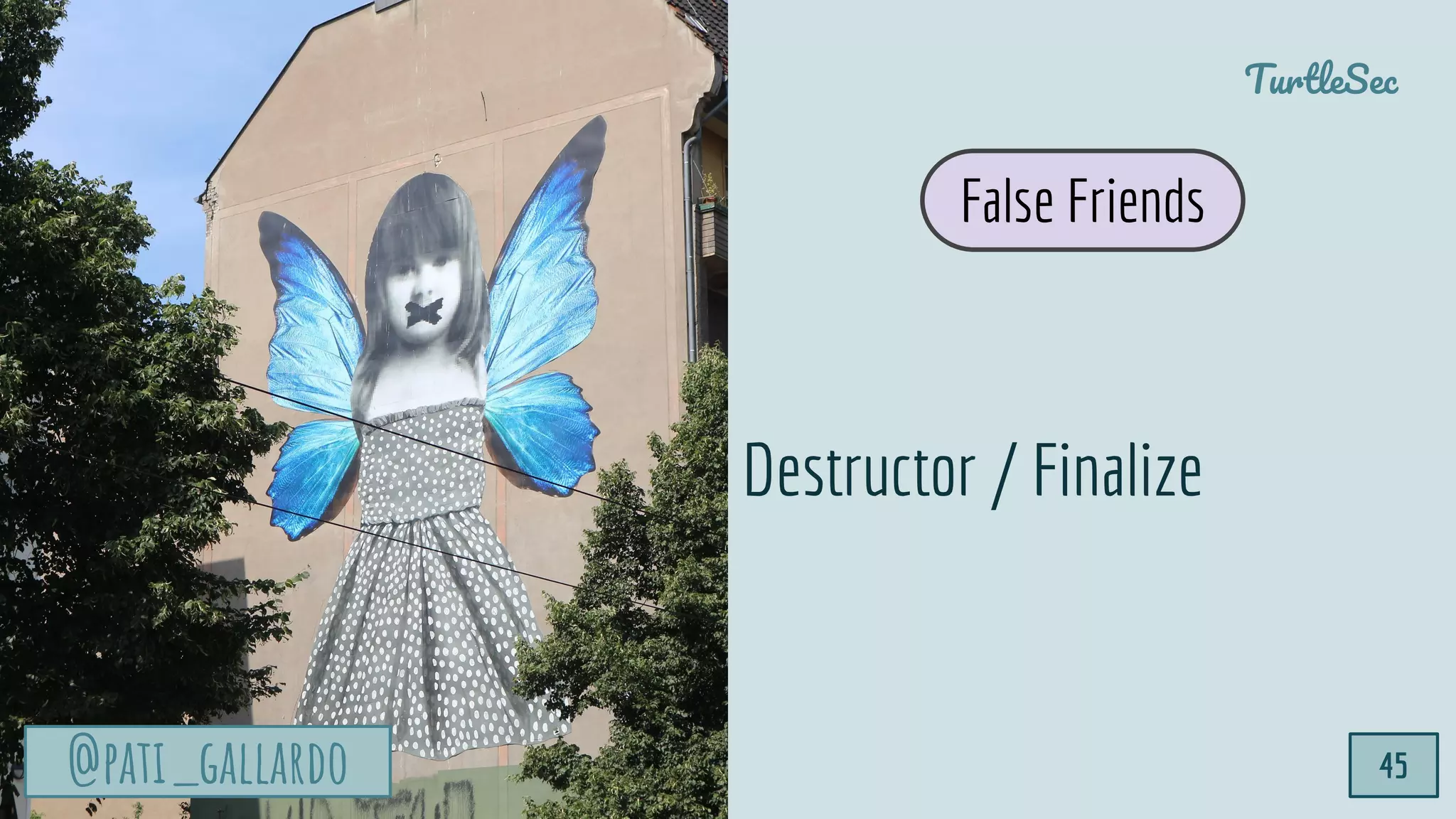
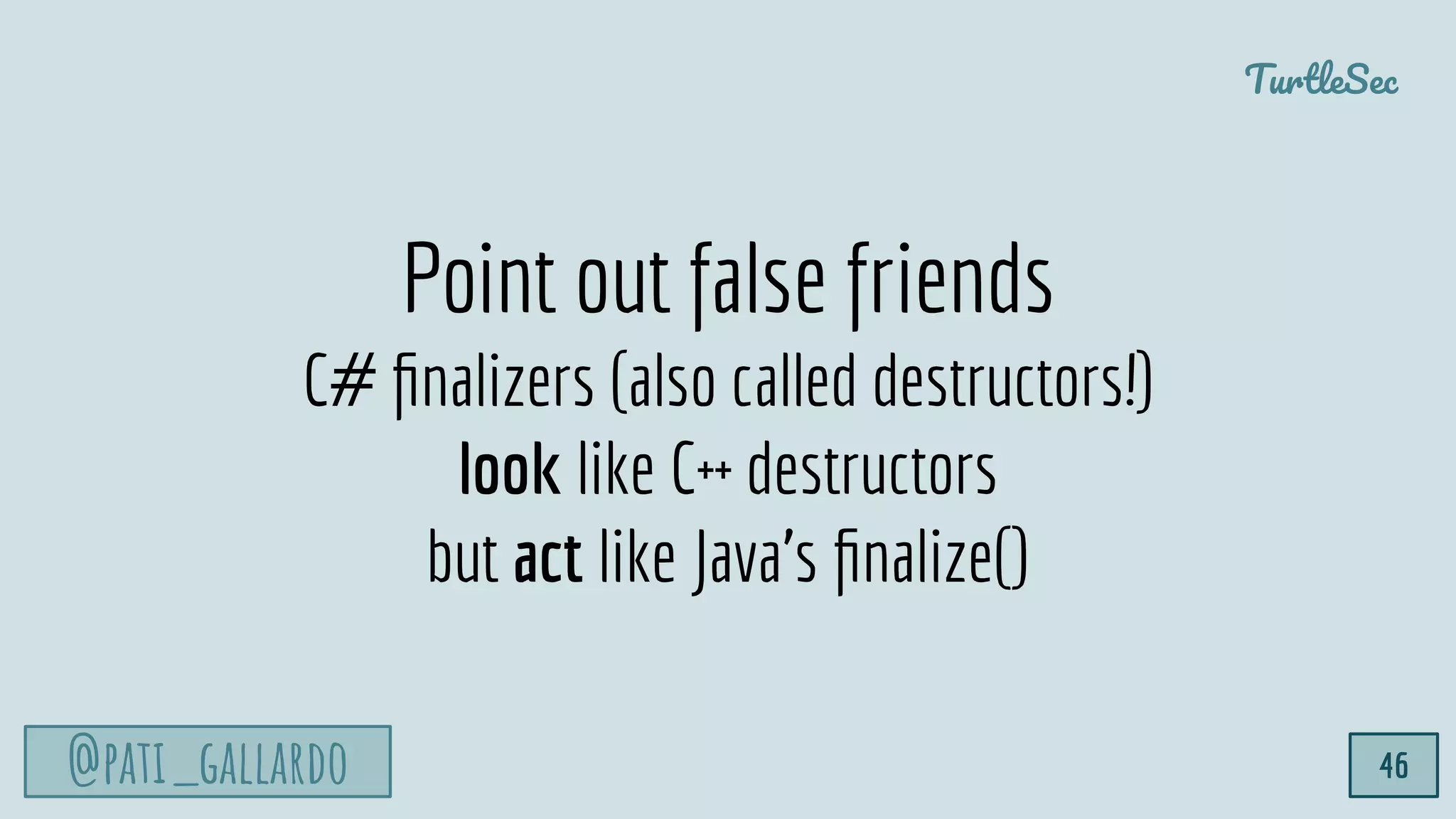
![@pati_gallardo
TurtleSec
[C++ & Java] Destructor / Finalize
1. public class DestroyMe {
2. ~DestroyMe() {
3. // Might be called by the
4. // Garbage Collector
5. }
6. }
@pati_gallardo 47
More like Java
finalize
Drift in Meaning](https://image.slidesharecdn.com/learninganewprogramminglanguage-201012175112/75/Thoughts-On-Learning-A-New-Programming-Language-47-2048.jpg)

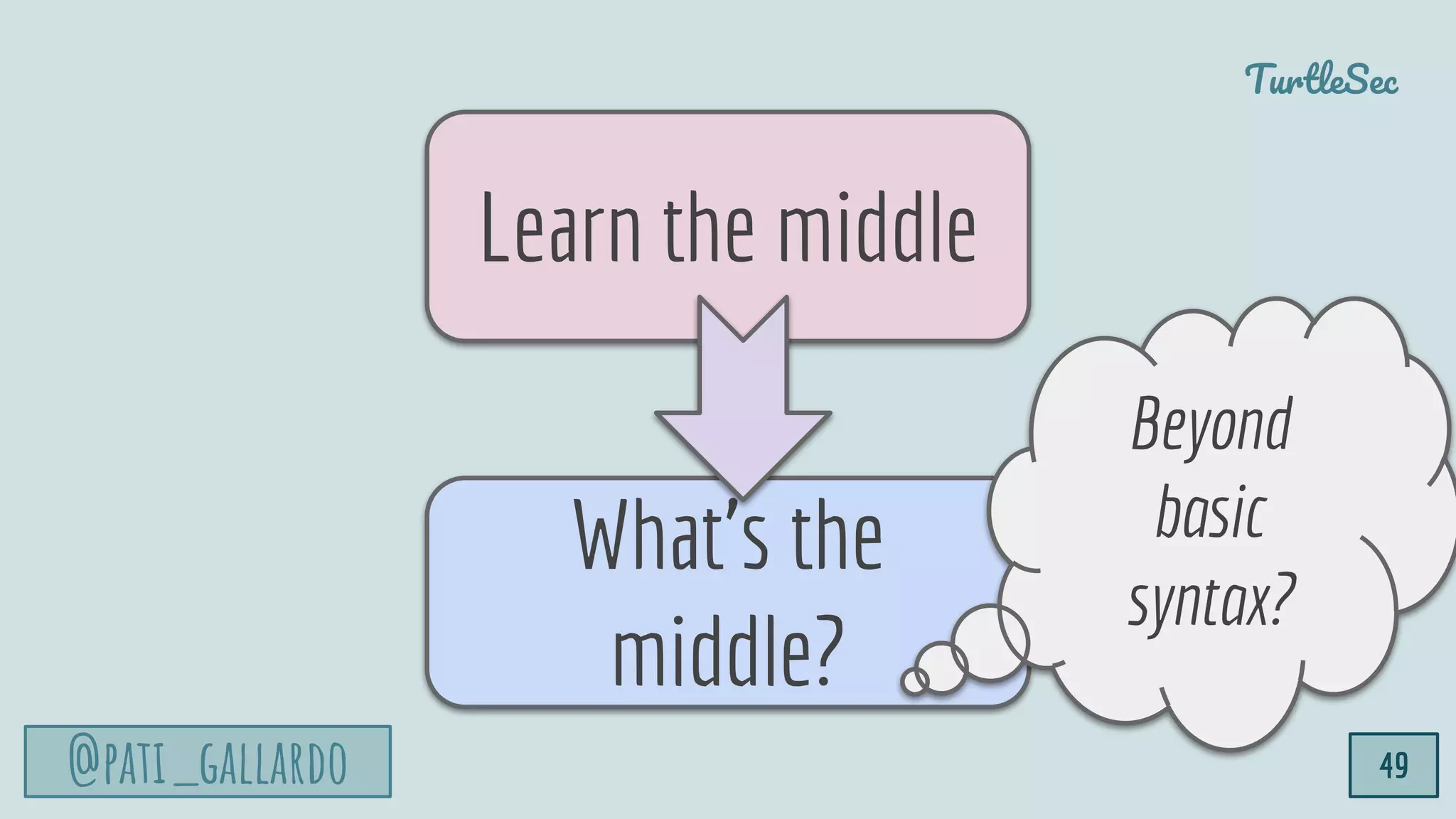
![@pati_gallardo
TurtleSec
[Java & C++] IDisposable
1. public class DisposeMe : IDisposable {
2. private FileStream fileStream;
3.
4. public void Dispose() {
5. fileStream?.Dispose();
6. }
7. }
@pati_gallardo 50
Similar to Javas
Closeable
Drift in Form
Same semantics
Different syntax](https://image.slidesharecdn.com/learninganewprogramminglanguage-201012175112/75/Thoughts-On-Learning-A-New-Programming-Language-50-2048.jpg)
![@pati_gallardo
TurtleSec
[Python] yield return (Generators)
1. public IEnumerable<int> YieldReturn() {
2. yield return 3;
3. yield return 4;
4. yield return 5;
5. }
6. [Test]
7. public void TestingYieldReturn() {
8. using var it = YieldReturn().GetEnumerator();
9. it.MoveNext();
10. Assert.AreEqual(3, it.Current);
11. it.MoveNext();
12. Assert.AreEqual(4, it.Current);
13. it.MoveNext();
14. Assert.AreEqual(5, it.Current);
15. }
@pati_gallardo 51](https://image.slidesharecdn.com/learninganewprogramminglanguage-201012175112/75/Thoughts-On-Learning-A-New-Programming-Language-51-2048.jpg)
![@pati_gallardo
TurtleSec
[Python, Java, C++] IEnumerable (Lazy Iterators)
1. // C# In Depth, Jon Skeet
2. // Lazy Evaluation
3. static IEnumerable<int> Fibonacci() {
4. int current = 0;
5. int next = 1;
6. while (true) {
7. yield return current;
8. int oldCurrent = current;
9. current = next;
10. next = next + oldCurrent;
11. }
12. }
@pati_gallardo 52](https://image.slidesharecdn.com/learninganewprogramminglanguage-201012175112/75/Thoughts-On-Learning-A-New-Programming-Language-52-2048.jpg)
![@pati_gallardo
TurtleSec
[?] Extension Methods (Extend 3-party Classes)
1. public class Target {}
2. public static class Extension {
3. public static void PrintHello(this Target t) {
4. Console.WriteLine("Hello World");
5. }
6. }
7. public class Test {
8. [Test]
9. public void TestExtension() {
10. Target target = new Target();
11. target.PrintHello();
12. }
13. }
@pati_gallardo 53](https://image.slidesharecdn.com/learninganewprogramminglanguage-201012175112/75/Thoughts-On-Learning-A-New-Programming-Language-53-2048.jpg)

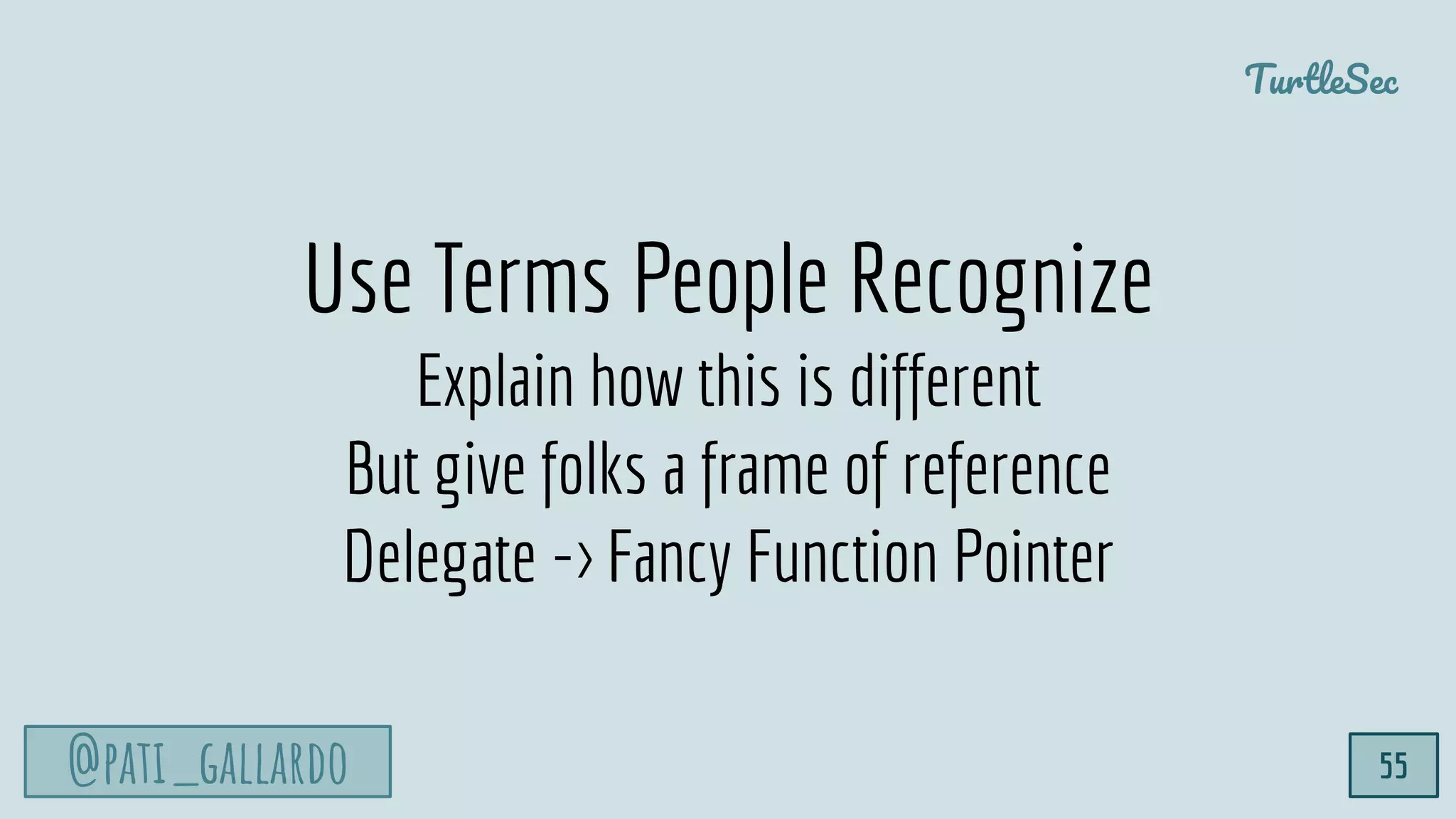
![@pati_gallardo
TurtleSec
[C & C++] Delegates ( Fancy Function Pointers)
1. public class DelegateTest {
2. public delegate void printMe();
3. [Test]
4. public void TestExtension() {
5. printMe printHello =
6. delegate {
7. Console.WriteLine("Hello World!");
8. };
9. printHello();
10. }
11. }
@pati_gallardo 56
Function Pointer
Type
Function
DefinitionUsing Function
Pointer](https://image.slidesharecdn.com/learninganewprogramminglanguage-201012175112/75/Thoughts-On-Learning-A-New-Programming-Language-56-2048.jpg)
![@pati_gallardo
TurtleSec
[C & C++] Delegates ( Fancy Function Pointers)
1. printMe first = delegate { Console.WriteLine("Hello"); };
2. printMe second = delegate { Console.WriteLine("World"); };
3.
4. var helloWorld = first + second;
5. helloWorld();
57
Composable
Function Pointers!
Operator + defined on
“function pointers”
@pati_gallardo](https://image.slidesharecdn.com/learninganewprogramminglanguage-201012175112/75/Thoughts-On-Learning-A-New-Programming-Language-57-2048.jpg)
![@pati_gallardo
TurtleSec
[C++ Qt] Events (Event Handlers)
1. EventHandler handler =
2. delegate {
3. Console.WriteLine("Hello Event!");
4. };
5. handler?.Invoke(this, EventArgs.Empty);
@pati_gallardo 58](https://image.slidesharecdn.com/learninganewprogramminglanguage-201012175112/75/Thoughts-On-Learning-A-New-Programming-Language-58-2048.jpg)
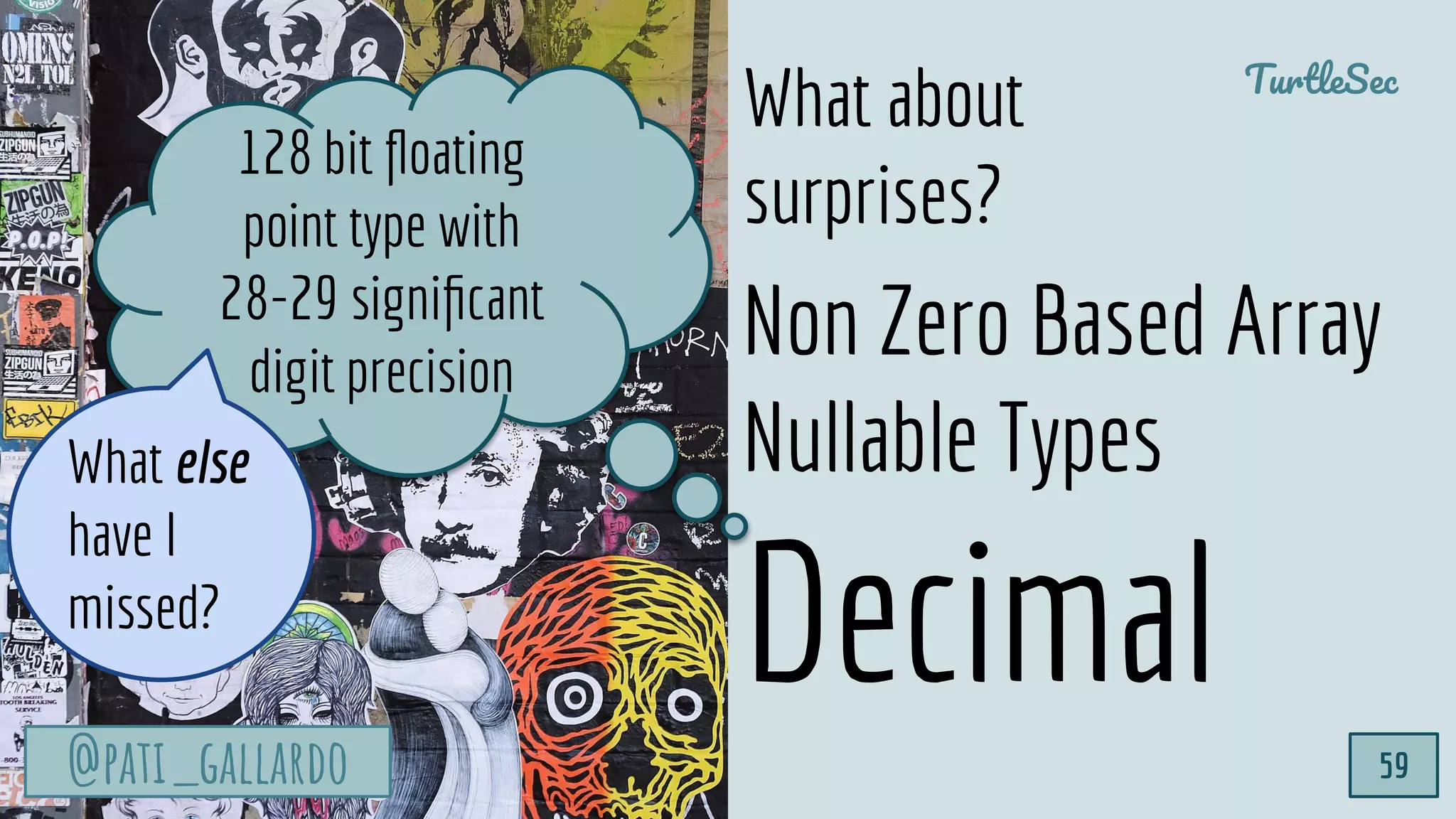
![@pati_gallardo
TurtleSec
Non Zero Based Array
1. Array array = Array.CreateInstance(typeof(int),
2. new[] {2},
3. new[] {42});
4. array.SetValue(5, 42);
5. array.SetValue(6, 43);
6. Assert.AreEqual(2, array.GetLength(0));
7. Assert.AreEqual(42, array.GetLowerBound(0));
8. Assert.AreEqual(43, array.GetUpperBound(0));
9. Assert.AreEqual(5, array.GetValue(42));
10. Assert.AreEqual(6, array.GetValue(43));
@pati_gallardo 60
I mean…. Wat?](https://image.slidesharecdn.com/learninganewprogramminglanguage-201012175112/75/Thoughts-On-Learning-A-New-Programming-Language-60-2048.jpg)
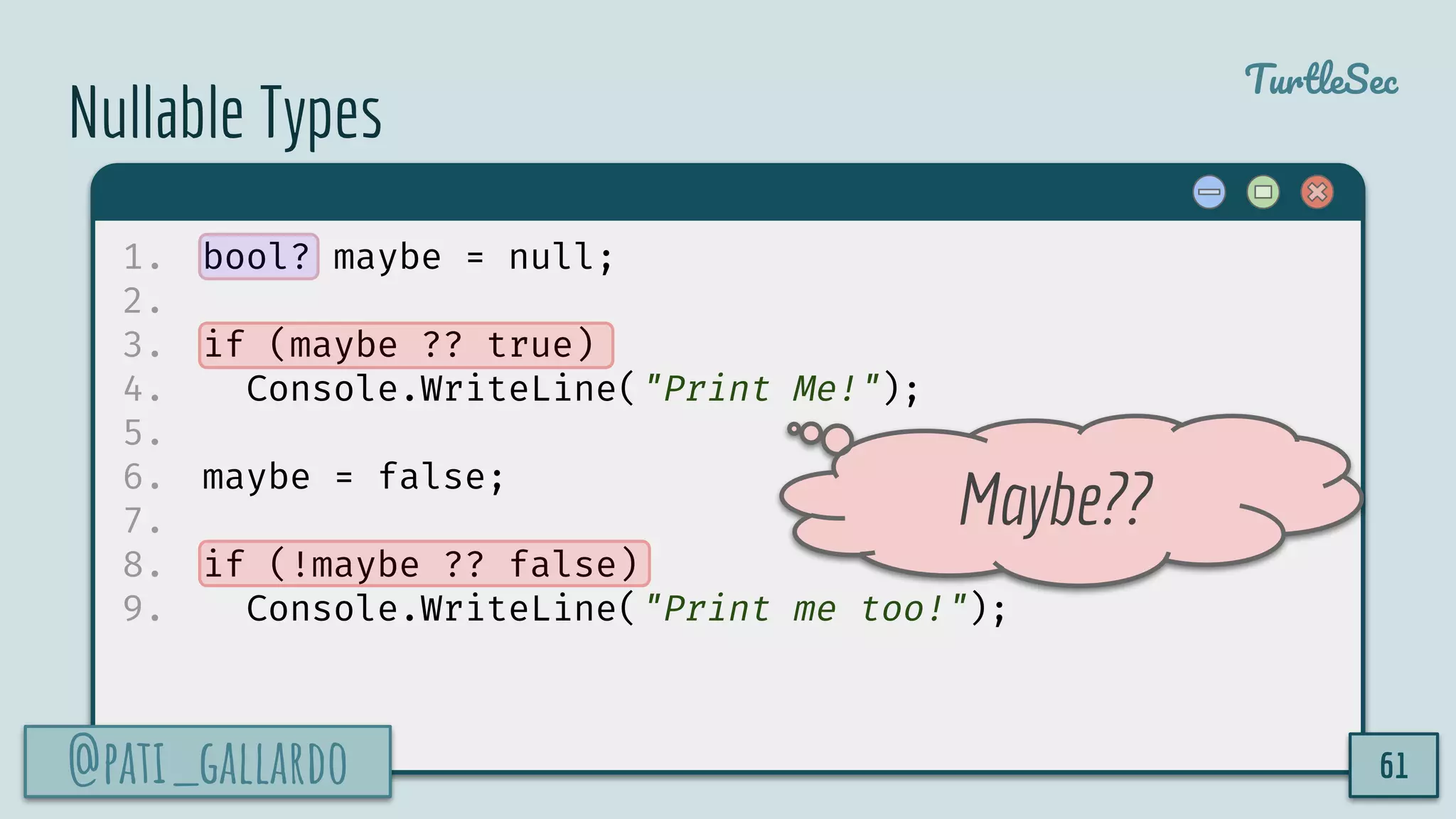

![@pati_gallardo
TurtleSec
[JavaScript] Anonymous Types
1. var gilmoreGirls =
2. new[] {
3. new { Name = "Loralai", Age = "36" },
4. new { Name = "Rory", Age = "20" }
5. };
@pati_gallardo 63
If you squint it looks
a bit like JS objects](https://image.slidesharecdn.com/learninganewprogramminglanguage-201012175112/75/Thoughts-On-Learning-A-New-Programming-Language-63-2048.jpg)
![@pati_gallardo
TurtleSec
[JavaScript] ExpandoObject
1. public delegate void printMe();
2.
3. [Test]
4. public void Test() {
5. dynamic expando = new ExpandoObject();
6. // Add a field
7. expando.GilmoreGirl = "Rory";
8. Assert.AreEqual("Rory", expando.GilmoreGirl);
9. // Add a function
10. printMe order = delegate { Console.WriteLine("Coffee!"); };
11. expando.getCoffee = order;
12. expando.getCoffee();
13. }
14.
@pati_gallardo 64
Full on JS!](https://image.slidesharecdn.com/learninganewprogramminglanguage-201012175112/75/Thoughts-On-Learning-A-New-Programming-Language-64-2048.jpg)
